#i very much identify with many queer coded villains
Text
We Really Need To Talk About Henry Creel and the "Psychopath" Label.
I'm putting the word "psychopath" on a high shelf and out of reach until further notice because we as a whole clearly a) does not understand what psychopathy is, b) does not know what it actually looks like in people, and c) is more than happy feeding into the already existing stigma around the disorder by using the term to describe someone who is a villain, but who's also very much not a psychopath if you look at his actual mannerisms and beliefs.
That is to say: If we completely ignore any timeline fuckery and treat Vecna/Henry like one singular guy...The terms you all are looking for are "pathological altruism", "superiority complex", cPTSD, and/or autism.
Y'know, things that can stem from intense, prolonged childhood trauma and are characterized by a) believing oneself to have the power, authority, and duty to fix others' problems for them, b) fluctuations in sensitivity/reactivity to triggering situations, and c) reactive judgmental behavior.
"Psychopath" is not a catch-all for villains, and it does not equate to "violent man disorder".
Let's do a little psychoanalysis of what Henry actually does, working chronologically.
Little Henry (age 12)
He's described as "sensitive".
This is code for many things throughout the show, some of which being artistic tendencies, quiet personality, increased vulnerability to emotional harm, queerness, neurodivergence, and connection to the supernatural.
He's shown gently collecting spiders in furnished jars.
Henry identifies with the spiders, identifies that they both have been cast aside, and uses that connection to reach the conclusion that the spiders need love and care. He then handles them gently and spends time making homes for them.
This alone is a display of empathy, sympathy, and compassion.
He's lonely, rejected by his mother and his peers.
This rejection hurts him, and he later bitterly internalizes/recontextualizes the experience to avoid that hurt.
He's called "broken", but later realizes that he isn't broken at all.
This indicates that he believed he was broken for some span of time, and his later anger surrounding the topic indicates that that experience hurt him.
He displays a variety of emotions.
Henry openly displays sadness, fear, anger, enjoyment, fascination, and excitement.
He is unable to hide his social "wrongness".
He couldn't hide the fact that he was different from the other children, indicating that a) he tried and failed, and b) he wanted to fit in at one point.
His father seemed to have liked him as a person.
Whatever was "wrong" with Henry, whatever it was that he couldn't hide, it wasn't something that made Victor dislike him.
He recognizes cruelty in society and openly condemns it.
Yes, I recognize the later irony in that. That's part of the narrative structure of his villain arc. This isn't about Vecna, it's about preteen Henry.
He hates dishonesty.
Whether it be dishonesty with others or with the self, Henry has a specific and powerful hatred of lying.
Now, if anyone tries to tell you about diagnosed "child psychopaths", they're lying to you.
Psychopathy is clinically knowns as Anti-Social Personality Disorder, and it cannot be diagnosed until ages 18+, since children tend to grow out of any "psychopathy markers" they might display in childhood. Children displaying these markers might be flagged as having "conduct disorder", but not psychopathy.
However, lets look at the markers anyway:
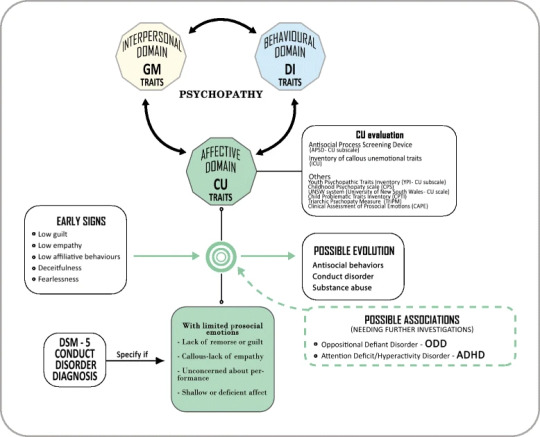
GM: Grandiose-Manipulative, DI: Daring-Impulsive, CU: Callous-Unemotional
Source
Conduct disorder: Generally characterized by aggression towards others/destruction of property, lying, theft, and limited prosocial emotions.
GM: Superficial charm, glibness, suave behavior. Megalomania and narcissism. Lying.
DI: Fearlessness, impulsivity, recklessness, lack of responsibility. Risk taking behaviors.
CU: Lack of remorse, empathy, sympathy, or compassion. Shallow emotional affect.
Let's tally him up.
Psychopathy:
Grandiose-Manipulative: ❌
Henry does not fit in, and it's clear to everyone that he does not fit in. He can't hide this, no matter how hard he tries. He is not charming or suave. He also internalizes the "broken" label and recognizes that he's rejected for a reason, and it hurts him. It's only later in his childhood that he realizes being different=/=being broken. He has a specific hatred of lying.
If we compare him to Billy, the narrative anti-hero who acts as both parallel and foil to him, we can see artificial charm in action. Billy lies and uses acting to get his way. Repeatedly (see: his interactions with Karen).
Billy represents GM behaviors in action.
Little Henry is, then, in direct conflict with GM traits.
Daring-Impulsive: ❌
Henry only lashes out with violence when he perceives himself as being in imminent danger. He is shown as and later described as being afraid. The only fearlessness we see is in regard to spiders, and that fearlessness can be traced back to his empathy for the spiders as disliked/socially rejected creatures.
Again, Billy. Billy and his erratic driving with Max in ST2 and his attempted fling with Karen are both classic displays of DI traits.
Little Henry, in contrast, does not display DI traits.
Callous-Unemotional: ❌
Henry displays a range of genuine emotions. He also displays empathy, sympathy, and compassion. He's described as a sensitive child, for heaven's sake.
Billy, as a contrast, does not display empathy, sympathy, or compassion. He's unnecessarily cruel and violent for his own entertainment (the car scene) or to maintain control (Max), and he does not display remorse for it.
Little Henry does not meet the criteria for CU traits.
Conduct Disorder:
Aggression/Destruction: ❌
Henry is often hiding, he's reclusive, his father describes him as "sensitive", and he's gentle with the spiders. Even his later visions aren't particularly aggressive. It's spiders crawling out of a drain, a cradle in a fireplace. Disturbing, yes, but not aggressive.
Henry is shown killing a rabbit, but his reaction is distinctly unhappy and we're only conclusively shown him doing so once. Due to differences in killing style between his singular kill and the other dead animals his family finds on the property and the fact that there are animals that show up mutilated on the Creel property which Henry wouldn't reasonably have access to (see: chickens)...It's not a concrete pattern of behavior.
He's not an aggressive child, especially if compared to Billy. Billy is openly violent and aggressive, and he seeks out opportunities to physically hurt others. Henry does not do this. He only lashes out when cornered, which is what happened in 1959 (if we take canon at face value).
Theft: ❌
We are not shown any instances of or inclination towards theft.
Low guilt/remorse: Inconclusive
Henry is shown (supposedly) practicing his powers on a rabbit, but he looks distinctly disturbed while doing so. Henry lashes out at his mother with his powers and displays little remorse, but that was self-defense, which muddies the remorse waters.
Compare him to Billy, who is clearly enjoying tormenting kids whenever he can (see: the fatshaming at the pool, Max in the car, Lucas at the Byers house).
Generally, Henry doesn't meet this criterion, but it remains inconclusive.
Low Empathy: ❌
Henry visibly and verbally displays empathy for the spiders (A similar trait in autism: more empathy for creatures than humans)
Low Affiliative Behaviors: Inconclusive
He has issues with regulating eye-contact (it seems like he tends to stare), and he doesn't seem to seek people out. He's reclusive and quiet. However, these are also shared traits with autism...or just being an introvert, and we do see him display warmth/happiness on multiple occasions. We also know he has interest in connection with others due to his later bitterness over the lack of connection he experienced as a child.
Deceitfulness: ❌
Henry hates lying and dishonesty. That's his whole thing.
Fearlessness: ❌
Henry visibly and verbally displays fear on many occasions.
Henry Creel, age 12, is not meeting the markers for conduct disorder/precursors for psychopathy.
Next time point.
Henry Creel, age 32: Orderly
He's good with kids.
He soothes El's anxiety, calmly engages with her anger surrounding her mother, sits on the floor beside her to be on her level, takes her concerns seriously, and tries to help her succeed against her struggles in the lab.
He's relatively social.
He's the only orderly who interacts with the children willingly/actively seeks out social connection with the children. He's shown wandering around the room observing them, and he seeks El out as company (this will come back later).
He's not harsh with the children.
In ST1, we see El being carries around by her arms and thrown around by orderlies. We see Henry being dragged by his arms by orderlies after his electrocution scene. Henry, even when given the authority of an orderly, doesn't engage in this kind of disregard for a) personal space, b) autonomy, and c) wellbeing. The worst we see from him is his reprimand of 002 when 002 is bullying El, and even that's just a quick verbal reprimand.
He empathizes and sympathizes with the children.
Henry is openly disturbed by 002's electrocution, even when no one is watching him except the audience. El isn't watching, Brenner isn't watching. Henry empathizes with 002, given that his own electrocution scene just happened in the previous episode. We're being shown genuine empathy and sympathy coming from Henry.
He's still quiet, gentle, and reclusive.
He often hunches in on himself when he's not being watched by Brenner. He's consistently soft-spoken and unassuming. His likability comes from his lack of stereotypical superficial charm/suaveness. He comes off as the guy who was bullied to hell and back as a kid, not like a politician (which is what psychopathic charm is most likened to).
When he isn't being like that, it's an act...and an unconvincing one at that.
Henry looks distinctly uncomfortable and out of place when he's trying to play the straight-backed, unfeeling orderly. We get tons of side-eye from him directed at Brenner. He doesn't enjoy being on display like that.
Henry tries to help El and then acknowledges that it didn't work/made things worse.
Henry tries to help El escape with no request for anything in return.
Her escape was not transactional. Soteria's removal only happened when El reached out about Henry not coming with her, and even then he never asks her to remove it. He gives her information, and then he lets her make her own choices. She wants him to come with, he did not ask her to set him free. All this, despite the fact that he easily could have asked her to remove it as repayment for letting her loose without any red flags being raised on El's part.
Henry displays concern for El's wellbeing
He takes her with him when the guards come running after Soteria, even though it would have been a good distraction/would have given him a head start if he'd left her. He defends her and himself from the guards who clearly want to hurt them. He hides her in the store room and tells her he's going to find them a way out.
Let's tally him up.
Grandiose-Manipulative: ❌
Henry still lacks the "classic" psychopathic charm. He's still a bit kooky, definitely not suave. A touch of narcissism might come into play with his desire to "save" El, but that's leaning into pathological altruism. He doesn't display himself as powerful, even after Soteria is removed. He's still soft-spoken and curled in on himself.
Of course, we could argue that he's doing all this to manipulate El. Sure...but he never asks for anything in return even when it would be logical and understandable to do so.
Getting El to remove Soteria would be like taking candy from a baby. All he'd have to do is say "If you take Soteria out, then I can help you escape. I can only help you if you take it out, though", and she'd do it. She's a lab-raised 8 year old.
It would be a far safer gamble for him to flex his authority than to...what? Not mention it and hope she says something? Hope she chooses to do something? Okay.
Hell, if we take the show at face value, no timelines or anything...Henry has already leveraged his authority with El before. "If you want to escape, you must do exactly as I say", he tells her in the chess scene...and then he just straight up never mentions Soteria.
No matter how you slice it...that wasn't manipulation. It was altruism.
Daring-Impulsive: ❌
Henry does display risk-taking behaviors, but we need to apply context. He's been locked and abused in this lab for 20 years, El's been there for 8 years under similar conditions...there's no chance at escape for either of them unless someone takes a risk. Even so, it's not the type of risk that's associated with thrill-seeking. He's not doing it for the thrill, he's doing it to get out.
Callous-Unfeeling: ❌
It's a bit more difficult to say that it's not an act here because he's usually being watched by El, however...in the times when he's not being watched, he displays empathy, sympathy, and compassion, and those displays are paired with distinction emotional expressions.
This is where the escape scene comes into play.
Henry once again only attacks once he's cornered and in danger (not to mention that this time he has a dependent to worry about). His plan is to run. He's not inclined towards violence until he's left with no other choice, and when he does lash out he doesn't actually use his powers to kill until that final guard (who seemed to take great pleasure in the prospect of getting to shocked both him and El). He throws the other soldiers around, but he doesn't give them that menacing, sadistic look. That's reserved for that specific guard. It's sadism borne of a personal grudge due to prolonged mistreatment. It's revenge, not sadism for the sake of sadism.
Orderly Henry Creel, age 32, definitely has something going on up there (likely a whopping dose of cPTSD). He sure is a Guy in a Situation. However, he does not meet the criteria for psychopathy.
And now, my favorite and most controversial section:
Vecna-Henry (ages 32-38)
First and foremost: I need you all to read this with the understanding that I am explaining behaviors, not excusing them. Nothing that happened was right or justified, based on a normal person's frame of mind. However, in order to even come close to psychoanalyzing someone, you have to get inside their head. It's their thoughts and motivations that matter here, not what outsiders judge them to be. That's why it takes months of talking and testing to pin down diagnoses.
We need to be able to look at things from Henry's point of view and piece it together in his frame of mind. You feel me? Good.
I'm abandoning the checklist format for this section because it requires more nuance than just "yes" or "no", but I'm still going to list off some key traits about Vecna:
He chooses his victims carefully.
Our 4 victims are not chosen willy-nilly. This isn't "I want to kill for fun", or we'd have Art the Clown instead. He personally kills exactly as many as he needs to open the Rifts, no more.
He doesn't kill for killing's sake.
Each victim is chosen with a specific backstory in mind.
I've spoken about this before, but if you know anything about serial killers it's that they're almost always going after victims that tie into their own trauma (i.e. killers with mommy issues going after women who look like their mothers, etc).
Stranger Things, of course, is a touch more intricate.
The order and specific stories of the victims tells a meta narrative. Chrissy and her horrible mother with the rotting food that's a direct link to the custom-made painting in the Creel dining room during the dinner scene. Fred and being a murderer, even though it was a negligent accident. Max and Billy, whose story is so complex and so inverse of Henry's that it fits perfectly with a song about swapping places to feel how the other feels. Again, a death outside of the victim's control, but this time tinged with the relief that an abuser had died after years of wishing for it to happen. Patrick and his abusive father, his abusive Papa, if you will.
They tell us a story, just like almost every other serial killer.
We know Virginia was a bad mother based on the situation Henry finds himself in at age 12, but we're never shown the extent of that conflict because we never see them interact. It wasn't physically possible for Henry to have killed Alice. How could Henry, who was near-fainting after having "killed" Virginia, find the strength to trance Victor and kill Alice? How could he do that, when we don't even see Vecna do that, when he's so much more powerful? He's not capable of multitasking. ST4 made that very clear. Thus, negligent death. Billy and Max vs the Creel murders are essentially just an inverse situation. Older abuser dies, the young victim wished for it to happen and is now Feeling Things about the situation. Lost a sibling in the process. And last but not least, Patrick, who shares a name with a lab guard in ST1 and has an abusive father. That's a Brenner link.
It's a story by proxy.
Vecna uses that shared trauma to connect with his victims. (That's the real deal: Shared Trauma). It's weaponized empathy.
He talks over and over again about honesty and ending suffering.
Those are his two huge Things in his kills. He holds up a mirror to what the victim perceives to be the worst part of them, and then he turns around and all but tells them he'll make it end. After all...everyone is just waiting, waiting for it all to be over.
He's got a fixation on making sure his victim knows that a) this was their fault, and b) he's being the Good Guy by relieving their suffering.
He has no reason left to pretend to have a Good Moral Justification for his kills, and yet he still talks to his victims like he's justifying their deaths.
That's...a lot, but let's dive right in.
Henry and his funky morality complex is endlessly fascinating to me, because what he seems to be doing is self-soothing about it all. Psychopaths, in contrast, are aware of moral compasses, of good and bad, but they aren't typically beholden to the concept. A psychopath likely wouldn't feel the need to self-soothe about their actions by telling themselves and others that they're doing what they're doing to relieve suffering...which is coincidentally exactly what Henry, as Vecna, does the whole time.
At this stage in the story, Henry would have no reason to keep up that kind of savior charade when his audience is just himself and his victim. There's no one there to manipulate by falsifying morality. The only other person listening is going to die imminently.
The interesting part comes in when we understand that Henry doesn't have to play the angel at all in ST4. He's certain he's already succeeded by the time we realize what he's up to. He doesn't have anything to gain by lying about his perceived morality. Psychopaths, generally speaking, don't care enough to put the effort into lying if it isn't useful. That means that the last time he would have actually needed to play the angel was during his 1979 monologue. However, we see the same phrases about suffering and the associated release that we hear in 1979 continuing to return as far in as 1986, when Henry no longer has any reason to lie, even if he were okay with lying in the first place (which he's not)! They're all genuine lines. They're a core part of his character.
Vecna wants to be in the right, in the clear, morally. He can't accept that what he's doing is abusive; he has to frame it specifically so that he is doing what's right, that he's freeing people and solving problems.
He's doing his damndest to actualize his "predator, but for good" line from 1979.
This does not smack of psychopathy.
This smells like a savior complex.
Even as far back as 1979, Henry has been obsessed with saving things from their problems ("Tricked you? No. I saved you"). He "saves" spiders from the vents of his house and gives them new homes, he "saves" El from the lab's brainwashing, he "saves" the ST4 victims from their suffering...and dare I say it...he "saves" the lab children in 1979 from their suffering as part of Brenner's lab, the only true escape from which is death (And if it was a 2-birds-1-stone situation with absorbing abilities...well. That's just a bonus).
Granted, the morality surrounding the manifestation of Henry's savior complex has been warped by massive psychic alteration and 20 years of unimaginable abuse with no feasible escape, so yeah. It's a little fucked up. He's a little fucked up. Obviously.
However, at it's core: Everything Henry has ever done has (in his mind) been Right, Good, and Necessary, despite the fact that he's now actively doing more harm than good.
This reeks of pathological altruism.
Here's what that can look like, clinically:

Source


Source

Source
Well damn, doesn't that sound familiar? (I'm staring directly at Henry's spider hoarding versus the above image)
"Saving" spiders, but condemning them to death in jars after his kidnapping.
"Saving" El from the lab, but traumatizing her and ultimately condemning her to his own fate: being the sole focus of Brenner's attention.
"Saving" the ST4 victims from their suffering, but hurting them in an attempt to kill two birds with one stone: free himself, and eliminate their suffering as a nice morality bonus.
Pathological Altruism. Savior Complex.
Jamie himself has said that, based on what has been shown to us, Henry truly believes that what he's doing is right and beneficial (which fits with his Catholic-God coding (here) so well).
All this to say, and I cannot stress this enough: This is not psychopathy. What Henry displays is not psychopathy. This is pathological altruism. Psychopaths, particularly those who go on to commit violent crimes, largely do not have savior complexes. A psychopathic serial killer would not care, and would not hide that they don't care if there isn't anything to gain from it.
Henry also has this incredible fixation on truth and right vs wrong, and yes, he weaponizes that, but again he does so while self-soothing with padded morality phrasing. He monologues for ages about how terrible it is that everyone is lying to themselves and others, and how everyone is suffering but no one wants to admit it. His main goal is remaking the world with a "better" version of society that's less oppressive (which happens to be one where a rule-bound society is entirely done away with).
Henry then swings way past "Good, Right, Necessary" into villain territory but going so far as to force his victims into facing the truth of what's going on inside their heads, forcing them to stop lying about their own mental states, only to then use the "worst" thing about themselves to judge them. He's quite literally playing God based on his use of right and wrong to maintain control/power while holding a moral high ground. (He's doing a pretty good job, too. He sounds just like the Catholic God.)
This is not psychopathic behavior.
His behavior seems more like black/white judgmental thinking:

A misguided and overwhelmingly strong sense of justice:
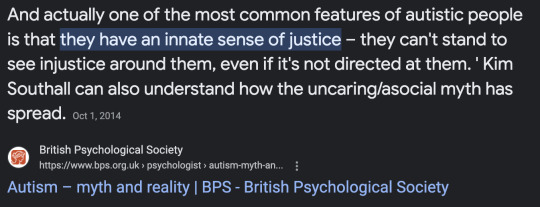
Source
and a killer superiority complex fueled by chronically low self-esteem:

Source
A psychopathic serial killer would have little attachment to truth or right and wrong.
A psychopathic serial killer would not care.

Source
The thing is: Henry's whole issue is that he cares entirely too much. His problem is that everything matters, everything can and should be sorted into good and evil, right and wrong (and obviously he is in the right here), save and destroy. It's judgement and warped justice and the need to believe he's special, that it all happened for a reason, that the world deserves to burn for what it did to people like him, that he can fix the world if he destroys it first.
This also happens to be why Henry cannot be considered a nihilist, which is another term I'm putting up on a shelf. Henry sees the world as inherently having value, that life has value, that there's something worth rebuilding (so long as he gets to dictate what the rules are...so long as he never gets hurt again). If he didn't care so much, he wouldn't be so damn upset about it all. He's a mess. He legitimately cares too much, the hurt is too deep.
That, in combination with the perspective warping from not only his absorptive quality but also 20 years of MKULTRA/Hawkins National Lab Fuckery, has created the mentality we see in ST4 and the actions it has manifested in (again, ignoring timelines).
Vecna is a violent, lab-made hypocrite with a touch of trauma-borne misanthropy, for sure, but he's not a psychopath.
tl; dr: Psychopathy is not synonymous with "villainous man disorder". Henry Creel is not a psychopath, though as it stands he is technically our villain.
#breaking: media fans told that psychopathy is NOT just ''evil man'' disorder#[squirts fans with a water bottle] AHT. AHT. PUT THE LABEL DOWN.#henry was a good kid. a good young man even. and i'm standing by it#henry creel analysis#henry/vecna/001#psychoanalyzing henry creel#st character analysis#stranger things
140 notes
·
View notes
Text
Captain Marvel through the male gaze.
Fellas, we need to talk about Captain Marvel.
And I do mean “we.” I am one of you. Says so right on my birth certificate and I’ve never had reason to question it no matter how much feminist and trans-positive media I marinate in. I enjoy stuff even if I don’t completely relate to it in every way. I enjoy insights into the lives and priorities of people who are very different from me.
Author's note: This is quickly going to take on the sort of lecturing tone that I don't really intend to be the default tone of this blog, but even having sat on this for a few days, my primary emotion is frustration and try as I might, I feel it would be dishonest to try to scrape that frustration off the page.
There’s no point in denying it. This is Girl Power the Movie. It is very much about a woman refusing to be told to calm down, quit being so emotional, or that she should respect her limits. Spoiler alert: she doesn’t take it well.
This movie is full of tropes we love when it's a man!
When scrawny pre-supersoldier serum Steve Rogers picks himself back up to face the bullies and declares “I can do this all day” who actually wants him to stay on the ground in a fetal position, whimpering?
So why do so many men cast themselves as the villains in this movie? Why do we assume we are the ones who are jeering Carol? Telling her to slow down, stay down, calm down, stop being emotional? Why do we identify with the people who are using her as a weapon? Why do we identify with the guy who gets snippy when Carol doesn’t find his flirting amusing or the fanatics destroying entire civilizations?
Why not identify with Talos or Fury? The men who trust Carol, try to unchain her, believe in her capacity for goodness?
Good Straight Male Representation can Still be Badass.
In the intervening years since this movie was in theaters, I forgot how great of a character Talos is. He makes me proud to be a man! He’s such a great character, Fury too! As a man, there are some great audience surrogates in this movie. Some people are constantly complaining that all masculinity is “toxic” now or that there are no positive representations of men who aren’t “queer coded.” Lets just set aside for the moment how much the fandom fanatically loves Steve Rogers and Bucky and focus on this film.
Talos is a loving husband and father who took extreme risks to protect his family. He also interrupts a cycle of violence by choosing to try to appeal to Carol’s conscience. Talos uses reason but he also uses emotion too. These are both tools in his kit, neither is a liability. If you need a macho flex, he handily beats Fury in hand to hand combat and is generally an effective fighter throughout the movie. Yet when push comes to shove, Talos’ most powerful weapon is his ability to find a window into Carol’s humanity and reawaken it.
Fury saw someone disoriented and helped rather than shot first! He followed his instincts into saving the world! He also, rather critically, was open to changing his mind. The aliens he fought valiantly not all that long ago, he was able to allow himself to recognize that they weren’t monsters, they were people driven by very similar instincts and desires as human beings. If you don’t think Fury is a hard man, he had just instigated a car wreck he barely walked away from to win a fight merely a day or two before helping save the planet.
Yes, Carol is aloof and cold throughout much of the film. She’s an alien soldier constantly being told to suppress her emotions and follow orders uncritically. That last part is key! The theme isn’t that logic is bad! The theme is that rationality without morality is wrong. Suppressing empathy actually strips you of your rationality, and opens you to being gaslit into thinking that victims are enemies. Talos and Fury both use empathy to unlock Carol’s true persona and as well as their fighting skills to save the day.
Conceal, Don’t Feel
Carol was a soldier, the mantra to follow orders makes sense in that context. However there was always an ulterior motive. She is an amnesiac serving an authoritarian state as a member of a death squad! That’s why they want her to be an automaton! They don’t want her or any Kree pondering the wider implications of what they’re doing. Sound familiar?
Put the Phone Down.
Consequently, this is a single screen experience. If you are not scrutinizing Larson’s face, her body language, and small details in her tone of voice, you’re missing most of her performance! You have to pay attention to Clint Eastwood or Mads Mikkelson, they play very minutiae focused characters. Same with Captain Marvel. It's less austere than Jenna Ortega’s Wednesday, but it’s not far off!
Strangers in a Strange Land
The Skrull story is also just fantastic. They can stand in for so many displaced and diasporic people. Kurds, Uighurs, Afghans - anyone greeted with suspicion and violence. Anti-Semitism is also back on the rise. Whatever spicy takes you have about the Balfour Declaration or the occupation of the West Bank, you’d do well to remember that if you think most Americans aren’t personally responsible when a wedding gets strafed, the same applies to people of Jewish descent.
The Skrulls can be anyone literally and literarily. They’re such a great representation of any group seen as an interloper. But in the end it's about family, safety, and finding a home. Not taking anything from anyone. They don’t even want vengeance.
If it’s not about you, Don’t Make it About You!
If you are a man, a fan of superhero movies, think women are or should be equal to men - not each equal in separate spheres but equal, and you think this is a man hating movie, explain to me because I just don’t get it. Why do you think the cast, crew, writers, etc. think you are Jude Law’s Yon-Rogg instead of Ben Mendelsohn’s Talos? How can this movie hate men when the men who are the good guys are so awesome? Who doesn’t want to be a badass spy like Fury?
Did you think they were talking about you when they included a biker who gets snippy when Carol doesn’t respond to his flirting? Who do you think Marvel thinks you are in this movie and why aren’t you seeing yourself in the heroes?
#captain marvel#carol danvers#marvel mcu#girl power#positive masculinity#nick fury#talos#samuel l jackson#brie larson#skrulls#diaspora#ben mendelsohn#male fragility#marvel rewatch#Captain Marvel Rewatch
74 notes
·
View notes
Text
cw: foucault, discussions of underage sex, fandom
happened to read foucault's essay on erotics, and the whole schema of greek pederasty and its complications, concerns, discourses, what have you. it's very interesting and not just bc the greeks hated the power of the prostate.
a lot of the latter part of the essay talks about how the greeks felt, more or less, that even though it was socially acceptable for a man to fuck a boy, the boy couldn't enjoy it, and if he enjoyed it too much and sought it out then his future reputation was at stake/ruined already + the man had to give the boy gifts (financial gifts being frowned upon because they prostituted the boy; gifts of guidance, teaching, and status being more acceptable and desirable) in order to earn his favor in order to fuck him and the boy could neither give in too easily nor hold out for too long. but it wasn't a mutually pleasurable act, it was a given to the older lover when he was considered to have earned it and it was a transient, age-based position; an adult male free citizen who was known to bottom for pleasure was considered shameful and incapable of leading. but it was okay to want boys, to desire beauty, to think of them as attractive, as long as one did not take from them by force or dishonor them.
the interesting thing to me about this is the way it intersects and entwines with modern fandom's notions of gay sex. obviously, fandom loves gay sex and there's no doubt about that. the thing is that in my experience, most fandom these days heavily centers bottoms and bottom subjectivity; to a lesser extent submissive subjectivity. it is ambivalent in most cases about top interiority and entirely uninterested in dominants except as facilitators of pleasure, pain, or catharsis for the sub/bottom.
of course, it's unfair to generalize and many people find their tastes departing from that described here for many reasons. nevertheless, it seems to me to be broadly true that in a group of people broadly motivated by exploring m/m intimacy, there isn't that much about tops: about wanting to top or dom, about love that expresses itself via control, guidance, and mastery over the beloved, about actively seeking out and thrilling in having power over another person. when these things do show up, they're frequently coded as abusive or outright only exist in abusive characters, which makes sense to a degree because these traits can also manifest in abusive ways.
but submissives and bottoms can also be abusive while fully and unequivocally being subs / bottoms, and most people are really uninterested in exploring that. this makes sense; nobody wants to imagine a beloved character as abusive, and very few people identify such types of predation in villainous characters, because villainy is the domain of the controlling, the sadistic, the power-seeking - it is never the domain of the masochist, the one whose power lies in passivity, who can make things happen without asking for them to happen, simply by wanting and providing themselves as an incentive.
and again, yes, associating bottom and submitting w passivity is problematic but works for our purposes because the essay i'm referring to also does the same thing. the link is not a permanent fixture so much as an association that people often lean into and that therefore shows up in the conversation.
all of this is to say that i don't think that fandom, which is dominated by afabs and trans people and rather fewer cis men, is so interested in bottoms as the subject of pleasure.
while the associative link between submitting, bottoming, passivity, and femininity is frequently complicated (queered, even) by these same demographics, and while many members of them have different relationships to these associations, the links persist for a reason; they're extant in society and they preoccupy us sexually. but i do think that there's a reason why the greeks considered bottoming and enjoying the act of bottoming nearly shameful even though cis gay penetrative sexual activity basically necessitates someone bottoming at all times...and i think that that reason is the other side of the coin of why modern queer fandom is broadly disengaged from topping as an enjoyable and desirable activity for their favorite characters even though they would verbally acknowledge that good sex should be mutually pleasurable due to modern sexual ethics.
in both cases, i think it's about shame. the greeks considered bottoming shameful because they thought a lot about honor and status and leadership, and the roles that a free citizen with good qualities could hope to occupy in the governance of the city, and they felt like a man who enjoyed submitting sexually (a man who enjoyed being the object of another's pleasure) could not be trusted to not submit in other senses as well even if the alternative was better for him and for those he had power over. but the sexual ethics of fandom - which is very queer, full of afabs, full of trans people - consider topping shameful because we think about status and leadership and power from the other direction, as inherently untrustworthy and corrupt, and we dislike people who seek out power consciously and cultivate favors in order to gain that power. it's shameful to want too much and take too much, to have control over other people and be comfortable with that, it's shameful to refuse to be vulnerable in the way that bottoming demands vulnerability (because topping, by implication, has no vulnerability attached).
that's one explanation and i don't wholly buy it. my other explanation would be interest: the greeks were concerned with a social life that revolved in no insignificant part around the power they expected to wield as free citizens, and therefore they were very anxious about the maintenance of their own power and they were concerned by the possible loss of power for the young men they desired. fandom, on the other hand, is concerned with an intimate life that centers the emotions and relationships of its characters, and therefore is interested in anything that brings those emotions to the forefront: again, vulnerability and weakness and pain and pleasure.
the third and most simple explanation is that the difference is anatomical: cis men are more likely to think bottoming is shameful because the primary instrument and act of pleasure for them centers around penetration, and being accessory to someone else's pleasure and enjoying it is shameful. women are more likely to think that topping is shameful because their primary acts of pleasure are ones of receiving, and rather than being accessory to someone else's pleasure they inhabit a paradigm where reception is indulgent, decadent, being spoiled and taking without giving. even if you think of topping as giving and bottoming as taking, taking is construed as selfish and giving is construed as generous. so, someone's favorite character bottoming is about that character getting to be selfish.
i don't like this explanation because it resorts to gender essentialism, and i really don't like any of these explanations and i'm dubious about the entire analogy i'm drawing, but hey. my blog, my long meandering posts that make no point at all. if u have thoughts feel free to send me an ask or a dm or something, this topic is very interesting to me.
18 notes
·
View notes
Text
I think, for me, the most offensive time someone tried to claim a character is "x-coded" is when someone who claimed to be my friend kept claiming the main character in my last fandom was "aroace-coded", "SO aroace", "HYPER aroace", and insisted that it was 100% intentional and if the creators knew what being aroace was back in the 80's-90's, they would have declared her aroace outright.
...Ignoring the fact that I identified as aroace. (That person was asexual, but in a "ew sexuality is so gross u-u" kind of way, which also leads me to not trusting them on ANYTHING regarding sexuality. They also couldn't interpret anything for shit either, despite claiming that "writing is objective" and to have perfect objectivity on everything, no matter what.)
Ignoring the fact that the series's entire plot hinged on this character being constantly flirted with and proposed to. So, if the character DID finally agree, the series would end.
Ignoring the fact that every single side material in existence during that portion of the series would pair that character up with people, or confirm a multitude of crushes they had on members of the opposite sex.
Ignoring that the only LGBTIA+/queer rep in the games were the ever-popular mixing up of gay/trans people and thoroughly mocking them, making them into really offensive stereotypes, and so on.
So, if the character WAS intended to be aroace, there'd probably be lots of jokes about "fixing her", or otherwise it would be used to further the fact that her main love interest was truly "the one" for her (it was reaaaallly heavily shipped, to the series's detriment at some points).
Also that overall feels way less real when someone else is able to talk about how much they view that character as a lesbian and how much they ship her with other girl characters, and THAT gets encouraged, and "oh I love your writing so much!!!"'s, but when I talked about my ship (the canonically teased one that was m/f) it's "I just think she's aroace u-u" "She's aroace-coded though u-u"
(Fun fact! Same person that insisted the 1 canonically bi character later on is actually gay because it's "uncomfortable" for him to show attraction to a female character!)
Also, I think the most damning, is that Coding is really specific to America and things that were showed in America during a specific time period. It's based on the Hay's Code, where, if you wanted your movie on the big screen, being queer was seen as something that either needed "fixed" by the end of the movie, or the character in question had to be killed if not fixed. That's why so many villains are queer-coded; villains weren't allowed to live either, and so, you might as well just make your villains queer if you wanted to have a queer character at all. Then you wouldn't have to get emotionally attached to a whole 'nother character just to kill them. (There wound up being something similar for comics, too.)
The Hay's Code ONLY affected things that were shown in America.
It WOULD NOT affect a Japan-only video game that was never localized into America, and was never planned to be. Plus, Japan just...doesn't really "code" characters? In my experience, Japanese media's pretty fucking free when they want to add gay characters or characters whose "only love" is [not a person]. They're not always the greatest at representation (perfectly capable of being as vile as depictions in other places...obviously), but I can only think of a few sparse examples of them just...hiding a character's orientation behind vague hints.
The person who insisted that Coding is an actual thing that can be applied to any piece of media for any reason (their reason in this case being that they just FELT it, they felt it VERY STRONGLY, so clearly it must be true and intended!!!) was not American, had not ever experienced anything to do with the Hay's Code, and only had their own word to go on.
Anyways, this is a really long-winded way of saying I hate "coding", I hate that fandom as a whole got its grubby little mitts on the fucking term, I hate the fact that people can't just admit they have a headcanon anymore, and they can't allow anyone else to have differing headcanons. (Not that THAT part is anything new. God forbid.)
Also sick to death of the double-standard. This is not the first time I've shipped something that's genuinely canonically teased or outright canonical (I'm a bit of a basic bitch when it comes to my starting ships) and someone INSISTED the character couldn't POSSIBLY like the other character, but a different ship was completely and totally fine. (Also insisting that this character's aroace, that character's gay, and that character's also gay, but I say my favorite character is pan and I don't think there's any real contradiction to that? "They can't be pan! That's weird. That's weird of you to say that :(")
#chaotic rants#not important#sorry i just...thought about All That again and im mad about it#also i hate 'minor-coding'#'minor-coded' and 'family-coded' arent a fucking thing#stop trying to make it a thing#just say you don't like the ship in question and fuck right off#im going to chew through drywall if i keep seeing people say#that certain characters in my current fandom are 'minor-coded'#i s2g
3 notes
·
View notes
Text
Something something the queer coding of many villains helps to engage with the inherent rage while still doing massive public damage something something
#nuance and angered feelings tonight lads#like on one hand#i very much identify with many queer coded villains#and their motives#and the desire to just Snap and give it all up#i too relate to the desperate need for catharsis#but also no straight person sees the nuance#they see an evil shallow vindictove flat villain#especially when not written by queer authors#but on the other hand identifying with the villain helps me to ponder Why#And what about that i want to emulate#anyway im definitely not overthinling personal opinions on medua tonight or anything
2 notes
·
View notes
Text
Like, ok, hear me out. My last post was quick and rough bc it was late at night, but now it's 4pm and I've had a thought, and I can def. explain it better now.
Ppl from minority groups esp. the queer community almost always end up connecting best with characters that are similarly othered and mistreated and demonised. There is a genuine, historic media trend of coding villains and monsters with our identities, and for a very long time, that was the best representation we could get. We grew used to identifying with evil because then we could take those characters with little fragments of our experiences in them, and we could re-write them in fandom to be sympathetic, to be loved, to be understood.
A game that takes the original story of the biblical Fall and translates it into a romance game is practically guaranteed to be a hit with queer people. Especially considering the context of the Fall - the fact that it's love that condemns them, a father who ousts them, a family that betrays them, and a situation in which what they stood up against wasn't legal but the punishment and injustice wasn't morally right.
It's quite literally a game about helping and loving beings who have been demonized, and helping them realise they're worth loving. It's a game that is going to strike home harder for people who have been othered as callously as the brothers were, and for people who grew up seeing characters like these as fictional representatives.
Solmare's decision to ultimately make the MC gender neutral futhered this drastically. The genre of otome is so naturally assigned towards straight, cis women that it can be difficult for anyone else to enjoy the games as much. We know, once again, that we're being othered; that the concept of creating a game like this for us is so unthought of, even the ones with M/M or F/F content are targeted more towards fujoshis and rated 18+. They're so very rarely meant for us.
But this game, centred around concepts of identity and family and loss and love, exists to give us the chance to fully immerse ourselves in a way most games of this genre often don't. Yes, sometimes it's evident, especially early on, that Solmare struggled to decipher how to slip out of inherently fem!MC tropes - but it's even more evident that genuine effort was placed into the game to welcome everyone. To let as many people as possible slot into MC's place, regardless of race, of sexuality, of gender.
This game, with its overall gameplay and storyline formula, is the perfect fit for people like us. The reason this game exploded so much more than Solmare's other games - the reason this fandom is so much bigger than the others before it - is in part because it drew us in like moths to a flame.
I literally cannot express how excited people were when we realised this game let you be you. I'm a gay trans guy; my best friend is a bisexual demigirl; the people I knew at the time Obey Me! was released were nonbinary, trans, gay, pansexual - a plethora of different identities and experiences, and very different game tastes. But all of us were enthralled by the concept of this game that didn't force pronouns or designs on you. That let us love beings we'd all felt sympathetic for in other iterations in other media. Even people I knew who hated the otome genre showed interest when they were told that the only identifying feature for the MC was a name.
This is one of the first times I have ever seen - let alone experienced - a game in this genre that not only allowed but actively encouraged people like us to play.
Obey Me! was not made for the queer community, but it was made in a way that welcomes us as much as the original target audience. That gives us as much importance and presence as the straight, cis female audience these games are usually pandered towards.
And now, Solmare are giving us something even more wonderful. Solmare have seen their fandom growing and diversifying, and they have accepted this. Accepted us. These new Exchange Students are being added to reflect the diversity of the people who play the game, and to include us in a way we often never get to experience in these genres.
We don't know who these characters are yet. We don't know anything about them beyond current speculation; that one of them is femme-presenting, and that at least two of them may be nonbinary. What we do know, at least, is that these characters are likely love interests, and that's genuinely incredible.
Because that means these characters are being added for us to love; those of us who aren't the original target audience, but who found the game and its themes and fell in love, anyway.
Because that means Solmare are acknowledging that a gender neutral MC is more than just "straight cis woman Lite"; that some of us do love women; that there's more to the spectrum than just male and female, and that they're just as viable to be loved.
So for the love of fuck, please let queer fans be excited. Please let us thrive in this one fucking game that thematically chimes with us, that lets us love, that lets us be ourselves. I don't care if you don't like the new femme character because you're not attracted to girls; you don't have to date them. I don't want to hear your comments about these characters "stealing your boys away". They aren't made for you. They're made for us.
Maybe it's weird to have content that's not aimed towards you. Maybe you were tonedeaf to the way the fandom grew, or to what it really meant when Solmare said they wanted Obey Me! to be an inclusive game. But please, please, read the room now. Let us love them without making it feel weird.
Because these characters in no way take from you, but they give so, so much to us.
#obey me#danteintherambles#Yeah y'all get some literary analysis and queer history in this#What would I use my MA for if not to ramble on passionately abt a game
489 notes
·
View notes
Text
How "Loki" managed to make Loki's "outed" version also be their most heteronormative one
Well hello again!! This one's gonna be a single post, and relatively shorter than my previous ones (God I hope). I just want to get into one little detail that bothered me while watching Loki — the blatant heteronormativity of all that.
I'm not even talking about plot, the well is deeper ( that's a Brazilian saying, I don't know if it exists in English. Oh well)
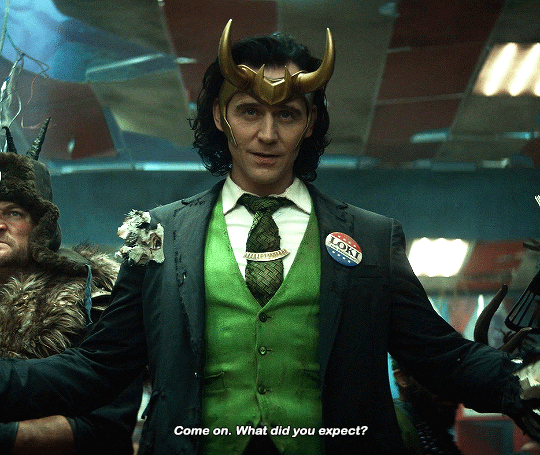
SO KKKKKKKKKKK LOKI HUH. Unless you've been hibernating for the last few months, you probably know that some time ago, Disney+ debuted its third series on the platform, Loki, AND TUMBLR WAS ON FIRE. And there's already been a lot of discussion regarding some aspects of the series, some plot choices, well, all sort of things. However, I won't get into all the issues regarding his bissexual representation, or the gender fluidity issue, or even anything regarding Sylvie or Mobius. If you want to know more about it, you can have quick walk around tumblr, or even just go and see what Russell T. Davies has to say about it. It was a crazy ride, this series.
But I know there are a lot of different takes on this matters, and there're many ways in which you can relate to a media or story, and it's not my place here to meddle. If you liked the series, if the queer representation of this series was something that resonated with you, was something meaningful to you, that's genuinely great. So I'll abstain myself to my area of study, Visual Culture, and therefore what I want to talk about here is costume design. More specifically, Loki's.
(just a disclaimer, I'll be refering to Loki using he/him pronoums, since in the series is clear that he identifies himself as male. Also, I won't cover any aspects of Loki in the comics — or even Norse mithology or other medias —and their portrail there, because otherwise this would be WAY longer, so I'll just stick to the MCU)
So let's talk about queer coding, shall we?
1. QUEER CODING
Ok so, let's say you walk into a room full of queer people and ask anyone who loved Disney villains as a kid to raise their hand.
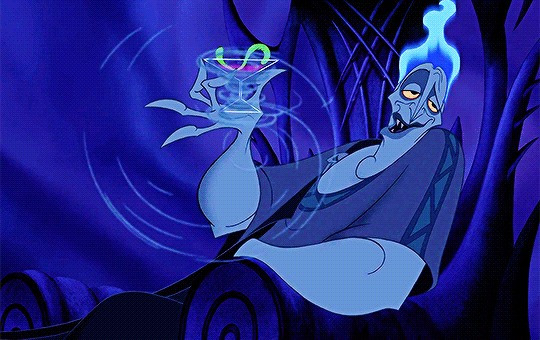
There'd probably be a very fair share of hands up, right? I mean, I know mine would. The relationship between Disney and queer kids has always been an interesting one, to say the least. And it's very common for many of us to feel especially drawn to the villains, and one of the possible reasons for it is the fact that most of the previous Disney villains (and some movie villains in general) are queercoded.
(and Kuzco. Interestingly, I never saw Kuzco being mentioned in these Disney queercoding discussions. Maybe The Emperor's New Groove is just more popular in South America...? Or maybe because it's like a positive representation, so it doesn't count? He's great tho, this movie is wonderful it's truly Disney's finest work I should make a whole post just extolling it just watch me BUT ANYWAY BACK ON TRACK)
If you google it, you'll see that queer coding is
"the subtextual coding of a character in media as queer. Though such a character's sexual identity may not be explicitly confirmed within their respective work, a character might be coded as queer through the use of traits and stereotypes recognisable to the audience. Such traits are greatly varied, but traits of exaggerated masculinity and femininity, vanity, and hypersexuality are frequent." [source: Wikipedia]
In the context of those movies, this was often made purposefully, blatantly, and in a very hurtful way, with very damaging implications, to associate (in a pejorative and stereotyped way) queer = evil. If you want to know more about it, and I highly recommend you do, there are two videos on YouTube by Rowan Ellis that explain these issues in a very complete, didactic way, and much better than I ever could. One's all about Disney villains, and the other is about the historical and social panoramas from queercoding to queerbaiting. I linked them both right there.
But the thing is, even though these are very problematic issues, what ended up happening is that many of us reclaimed those Disney villains. We felt attracted, drawn, captivated by a lot of them (not the Pocahontas one, that one is just bad). To the point where they might be our favorite characters in the movies. And why does it have to do with Loki?
Well, because, let's face it, Loki looks like a Disney villain.
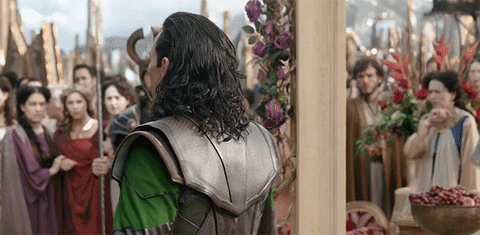
the attitude. LOOK AT HIM
And that was one of the things that amused me the most when I'd go see a Thor or an Avengers movie, because not only would Tom Hiddleston's impeccable acting make the character completely captivating to me, but his outstanding looks always caught my eye.
In my humble opinion, in all the movies he's been in Loki has the most interesting costumes. They are always not only incredibly beautiful but also richly detailed, always following the color palette of Green, Black and Gold, even when he's wearing casual style. I also love how the gold is always used in adornments, and how well-fit his clothes always look. He looks like he'd only wear Asgardian haute couture.

I mean, look at the patterned scarf (which looks enormously like a leopard print to me) with green accents, stylishly matching his black vest and longcoat. THE CANE.
Of course the other costumes are also ok (Thor's armor for example has shades of blue, silver and red, all opposite to Loki's colors - although unlike Loki he almost never changes his outfits, which is a bit disappointing to me). But look at how Thor's outfit is made to make him look big, strong, MASCULINE and caricatured, while Loki's is simply elegant and slim.
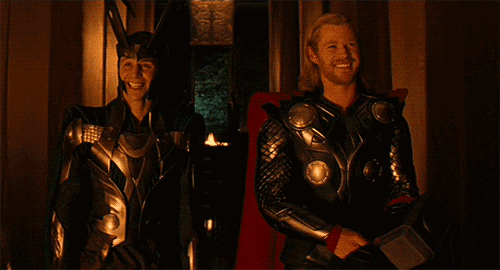
His shoulder pads resonate the same shape as Thor's, but are narrower, making him look smaller in comparison. And I find it interesting how (unlike Thor who has an outfit pretty much the same as his comics counterpart) they stripped the more rustic fur trim from Loki's comics design, but kept the characteristic (and more elegant) square shoulder armor/pads.
In short, it's like his whole visual concept is to look dark, slim, fit and elegant.

And oh my, the sass
And Loki's costume designs actually have very beautiful meanings? As you can see in this Buzzfeed interview with Co-Founder and former Co-Head of Visual Development at Marvel Studios Charlie Wen and Marvel Studios Senior Visual Development Artist Anthony Francisco, when designing the character's casual Asgardian clothes, they made the clothe's lines
"more angular, almost architectural in its repeating angles. The purpose was to contrast the soft interior greens (Loki’s primary color) with the rigid blocky exterior (symbolizing Loki trapped inside the rigid walls of Asgard)."
The green color represents his soft interior. In a similar association, his characteristic collar was inspired by the flower faux calla lily, symbolizing "sacrifice and a resurrection motif". It's all very poetic. They deepened this concept in Loki's clothing in Ragnarok, where the replacement of green for blue in his clothes was meant to represent grief and sadness, and his personal growth.
"It's kind of like a nice arc for him. In the beginning of the movie he's green, then he's blue, then he's green again...by the end of the movie, he finds who he is," they said
But with the blue outfit, they added a yellow cape to represent that things would be all right at the end. Yellow and blue also make green. So like, colors mean something here. And they also wanted the blue to evoke a peacock, since Loki was showing himself off to the Grandmaster. A 10/10 outfit. Because you see, asides being elegant and dark and all that, the thing is Loki is flashy, both in his style as in his body language.
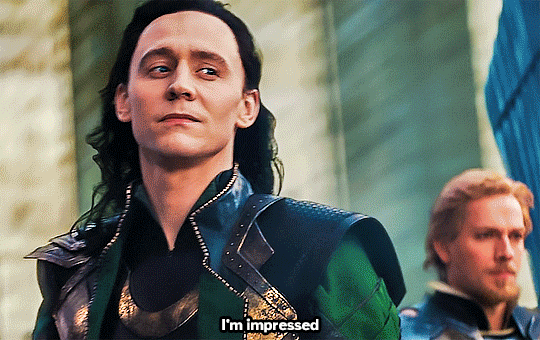
And of course none of this necessarily means anything. Things like physical appearance, fashion choices and personality traits have absolutely nothing to do with a person's sexual orientation or gender identity. But just as in the case of the Disney villains, there are certain characteristics and representations tendencies that due to both social constructions and pre-established media codes (such as the ones influenced by the Hays Code, and others), when watching, we feel more inclined to perceive as being queer. And while this usually has a pretty negative connotation (since these evocative traits are usually based on harmful stereotypes), with Loki this wasn't necessarily the case.
Even though he was introduced as a villain from the beginning, Loki has always been decently built, deepened and humanized throughout the films. Even though he was queercoded, he was never defined by grimaces, clothes or stereotypes, nor were these ever necessarily the target of bigoted jokes.
And on top of that, his personal narrative revolved precisely around the sense of feeling like an outsider within your own family. Of feeling less loved, less valued, "trapped", because of a trait he desperately has to keep secret. In this case, it was being blue. But you can change blue for queer that still works fine. It was a very familiar narrative to many queer people watching. So in a way, I think we ended up reclaiming him as well.
And I genuinely think that might have been one of the reasons this character became so loved by the LGBTQIA+ and tumblr communities. He was fabulous, and his presentation and personality reflected that perfectly.
And where did it all end? In Loki.
2. HETERONORMATIVITY
Because you see, in Loki, the only scenes where he actively wears his usual clothes are at the beginning of the series, and then never again. For the rest of the series, he wears the TVA brown coat and later a plain white shirt with a tie.
And while he was on TVA, ok, perfect, they required him to wear these clothes, fine. But after he runs off with Sylvie, he finds himself in SEVERAL situations where he might as well change his clothes. As is constantly explained to us, he can alter his appearance as he pleases and magically create fabrics and clothes at his own pleasure.
But in the one situation where he actively does this (in the train), he chooses to continue with the clothes he got from TVA (and Mobius, which is a cute point of view, but not the point here)

SO JOYFULL!!!
And for the rest of the series, he apparently forgets about his clothes and sticks to that. In that same train, is also revealed to us as an audience that Loki is indeed queer. In a intimate conversation with Sylvie, he is said to like both men and women, and the director reffered to him as bisexual.
And from there he develops a deep affective relationship with Sylvie, a woman (as we were emphatically told in that slightly misogeneous scene between the Lokis where they debate the mere existence of a "female Loki"), which regarding his queerness would be perfectly fine, if it weren't for the change in Loki's presentation from then on.
BECAUSE YOU SEE one of the major point of the Loki series is the development of the title character. Especially, his development in becoming "a better person". He starts off being a so-called pompous narcissist (much like Kuzco if you think about it), meets people who change his perception of himself and the world, and then he starts trying to improve, and redeem himself. In short, becoming a hero (again, just like Kuzco, only The Emperor's New Groove does it better).
And one of the most important things about character design is that a character's costume essentially reflects who that character is, much more than their lines or actions. Just by looking at a character's costume (if it's a good costume) you can basically know everything the movie or series or play wants you to know. And especially if you're telling a story where a character goes through internal changes, the exterior (ie, their costume) should reflect that as well.
So, Loki goes through his great journey, changes, evolves as a person, becomes a hero, and how does his presentation reflects that?

I could laugh but then my laughter would turn into tears
No, really, please. I'm not talking about Sylvie please don't think I'm in any way attacking Sylvie here, just look at him. The kinda grimy white tight shirt, enhancing his chest? The rolled up sleeves??? The leather straps holding his weapon and once again enhancing his chest? The creases in his pants evidencing his pelvis? HIS POSE????? This is a CLASSIC cis straight heroic white male lead pose. This is the kind of aesthetics I'd expect from Chris Pratt in a Jurassic World movie, and I know that you can see it too.
At no point in any movie has Loki ever presented that kind of body posture, that kind of body language. It's as if the show was saying "See? He's tough now"
And there is none of the elements that Wen and Francisco had so beautifully enshrined in Loki's costume composition, in the visual narrative that his clothes would tell. No color scheme, no green, no lily, nor nothing reminiscent of the characteristic curved necklace centerpiece he always wore (which according to Wen and Francisco, is an element that symbolizes Loki's mother, Frigga, like a "mother's crest". Interestingly, notice tho how Sylvie's costume has it, and I don't know if I find it endearing or disturbing)
So, since there's no reference to anything previously used by Loki in the first Thor and Avengers, the only symbology I can attribute to this costume choice is to show how Loki now doesn't care about things like looks anymore. His clothes are dirty, he didn't even bother to change them at all, he's not the same man who started this journey, he dropped Gucci. (They even made a joke about how he magically summoned an ugly blanket to cover him and Sylvie) And consciously or not, I genuinely think it's possible they wanted to make him more "hero-looking", "good-guy-looking". And apparently that meant making him less queer-looking.
And of course there's no way I'm saying queercoding is a good thing But why couldn't he save the world with his fabulous looks? Why couldn't he be the good guy and be flashy? Why couldn't he go through the arc of discovering emotional vulnerability and being able to open up to other people and still enjoy nice clothes and gold? Why couldn't he kiss the girl and have, idk, black painted nails? To me this has the same bitter taste as the recent Disney movie Jungle Cruise, in which the queer character proves his worth when he "man-ups". (And besides, this film is very derogatory in the portrait of South America??? But anyway)
And again, of course none of this necessarily means anything. Your choice of fashion has no direct bearing on how queer you are or not. People express themselves in different ways, but we're not talking about real people. Loki is not a real person, but a character whose wardrobe and gestures and lines were all decided and thought out by an external group of people, with goals and direct consequences in our perception.
And this is even more evident and difficult to ignore for me by how much the series itself shows. In the scene where he meets the other Loki variants, if you notice, everyone is dressed in very elaborate costumes. Honestly, President Loki is MAGNIFICENT with that green vest, the one sided shoulder pad detail, and the textured tie evoking something reptilian (I also loved how they adapted the characteristic gold necklace into a tie pin). But the thing is, he is represented as being, in a way, evil.
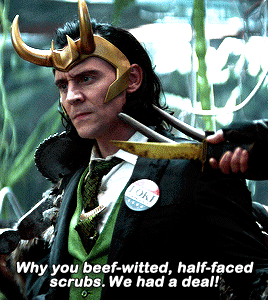
They all are. They are shown to be, you know, "the older Loki" versions, those who haven't evolved as much, you know. They're still treacherous, and liars, and slippery, and cowards, and suspicious, and back-stabbers, and narcissists, and bla bla bla. "Our" Loki even calls them "monsters". And since he stands out so much from them all, with his simple, modest, heteronormative clothes, it's very easy for our brain to make an association between "dressing" and "acting." And suddenly Loki's old flashness turns into a harmful stereotype.
Because now the way he dressed is a possible implication of when he was a "bad person". From when he had all the characteristics I mentioned above (all commonly associated with queer people in a pejorative way). And that's so disappointing to me, because in my opinion they missed a great opportunity to get the exact opposite message across. In a social context where the media still villainizes queer traits SO MUCH, where works like Rock Horror Picture Show are still seen as grotesque and villainous by so many people, they could have made a fabulous hero. A queer hero, with characteristics reclaimed by us as a community, portrayed in a beautiful and positive way, just as we see them.
So, this was all only the point of view that I took from the costumes. But the point is that costumes tell a story. They deliver a message. So in Loki's case, what message is this?
Think about it.
Anyway, thank you so much for reading!!!
#he was confirmed queer but at what cost#AT WHAT COST#I'm a bitter lesbian pls be kind#loki#loki series#marvel mcu#mcugifs#meta#queer#queer coding#bissexual#tom hiddleston#disney villains#queer theory#costume design
263 notes
·
View notes
Text
Team Rocket and My Generation
I've got a hankering for literary analysis—but I'm going to be teaching accelerated ENG 101 courses for the next eight weeks, and I don't have the time to finish that article I've had sitting in a folder for months. And I want to write something fun!

So let's talk about these guys: Team Rocket!
Every late millennial and early zoomer knows this trio. The Pokémon anime's wacky weekly antagonists are, in many ways, more iconic than its protagonist, Ash/Satoshi. Where Ash is a flatly likable kid protagonist, meant for target viewers to map themselves onto, Team Rocket has more positive substance to their personalities.
They're flamboyant and silly, in a slightly anachronistic camp-queer way that hearkens back to older anime and manga. Jesse is a dramatic diva whose high femme aesthetic belies a decidedly butch brand of working-class toughness; James is the rosy shoujo dream boy made laughable for being outside his genre, with effeminately sensitive feelings and a penchant for crossdressing; and Meowth is this sassy little wisecracking gremlin, the perfect opposite of Pikachu and his cute little "pika-piiii"s.
As the low-stakes villains of a children's show, they're designed to be likeable and laughable—and the show writers achieve this by making them, well, queer-coded doofuses.
But what makes Team Rocket unique among the crowd of queer-coded 90s animated villains is that viewers who grew up with them now wholly embrace them. Not in a self-indulgent way, not as a reclamation of characters wrongly cast as the bad guys, but just... open and earnest fondness. This isn't some Disney villain "we-stan-an-evil-queen" fandom, but something much warmer and more sincere.
As my generation reached what can nominally be called adulthood, we felt a surprising spark of recognition when we looked back on Team Rocket, and with it came this outpouring of love. We identify with Team Rocket now, and now I'd like to talk about it.

On the one hand, I think it should be acknowledged that the Pokémon writers have, over the years, written an excellent trio of characters. All the little sympathetic touches given to Team Rocket over the years have built up, accumulated, and ended up creating some very well-fleshed-out antagonists, almost by accident.
Each of them has a sympathetic backstory from polar opposite ends of the socioeconomic spectrum. James comes from a wealthy family that completely disregarded his emotional needs, while Jessie was a poor girl struggling in the foster system. Along the way, each picks up tearjerker experiences that humanize them and endear them to the viewer, such that we really root for them as individuals even when we oppose them as Ash's antagonists.
Even when they're being nasty little mischief-makers, they're so fun and campy and silly that we just enjoy their screen presence. I remember, as a kid, eagerly waiting to see what ridiculous costumed trick they'd pull in that week's episode.
But on the other hand, that doesn't really explain why such a wide slice of the late-millennial-early-zoomer generation identifies with Team Rocket.
No, we identify with them—and love them—because they're losers.
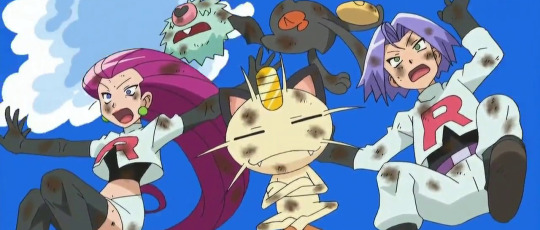
They're queer-coded twenty-somethings struggling to make ends meet, working for a distant boss who doesn't care about them, chasing an impossibly lucky and talented child who always bests them despite being an idiot.
Every time, their plans fail in a spectacular explosion, but they have no choice but to pick themselves up and try again.
Team Rocket struggles, in a way that offers no easy answers or clear options, and the only way they get through it is with each other. They commiserate in their shared failure, their shared struggle against an apathetic world full of brilliant anime prodigies, and they get by somehow.
And that's why we map ourselves onto them. As late millennials struggle and bumble our way through the empty promise that is adulthood in the 2020s, we look back on Team Rocket and recognize our own struggles. And we commiserate with them.
Let me use an analogy that occurred to me as I was discussing this with my girlfriend, the wonderful @impossiblejellyfishfart.
Ash Ketchum is like... he's like a Quaker chocolate-chip granola bar. A healthy and energizing snack, kind of, in name only, but still more than enough to get a kid through the morning.
And if Ash is a sugary granola bar packed in your lunch bag, Team Rocket is a greasy carryout pizza picked up with your coworkers after a late shift. It's not made with love—quite the opposite, and that's why it's so tasty in the moment and so awful later on. The love comes from who you share it with, from the bitching and moaning and laughing and joking and carrying on, squeezing out a moment of delirious exhausted joy before returning to the grind tomorrow. That's Team Rocket.
And I should say, also, that despite everything, they're still bright and wonderful. They're still a joy to see onscreen, and they still make each other happy.
And it's not because of raw talent; they lose to Ash and friends every episode. It's by virtue of who they are, liking what they like, and pursuing it despite obstacles.
I think that's so deeply refreshing and reassuring, the message that you can shine just by embracing your authentic self, even if that self is silly and campy and queer and weird. Even if your circumstances are hard, and you're not able to pursue everything you hoped to have in life. Speaking for myself, an online adjunct professor who worked retail for years prior, living in a place where it's unsafe to be myself, I know that I find comfort in it. And for that, I love Team Rocket.
I don't think I'm the only one. I can't begin to count all the cool pieces of Team Rocket fan art I've seen in the past, say, five years—fan art depicting them as barely-together disasters, sleek fashion icons, and everything in-between.
With that in mind, everything I've said is pretty obvious; we've all been picking up on it, and expressing it in different ways.
But still I find it fascinating that such a big slice of my generation identifies with a trio of failed trickster characters. Usually the trickster archetype embodies the weakling's defiance of a dominant, straightforwardly powerful entity—and usually that entity represents, or at least echoes, an oppressive majority.
Anansi the Spider tricks a bigger and stronger animal for some temporary advantage, enjoys it until the consequences hit him, and escapes with, at most, a harmless reminder that he flew too close to the flame. Often he gains some token or skill that helps him later, and further characterizes him as, recognizably, a spider.
Team Rocket tricks stronger and better trainers for some temporary advantage, usually stolen Pokémon, enjoys this until the protagonists catch them... and then they lose. They suffer no permanent harm, but they win no permanent gain. They're like Sisyphus pushing his boulder—except it's their lives, not their afterlives.
It would be one thing if they remained flat antagonists with no interior lives, but as I mention above, it's clear that they do have human emotions and needs. The constant failure does get to them over time. There are several episodes, from what I've seen, in which any number of the trio attempts to break away from Team Rocket and start anew, or at least they feel pressured to do so. Constantly, the question hangs over their heads, "Why are we still doing this?" And there's never a lasting, satisfactory answer.
How horrible! I know this reads like one of those clickbait articles attempting to cast a childhood show as something grim, dark, and menacing...
...but, like, that's my honest read of Team Rocket's situation.
They've passed the point where a trickster can ever win, no matter how clever—and narratively, as the bad guys, they're never positioned to win.
Even if Giovanni were to meet them with respect and support, and give them the tools they'd need to succeed, the structure governing their existence as characters prevents them from ever winning. And doesn't that reflect our own confinement to a society that's actively failing us? Doesn't that resonate in the same way, emotionally?
Maybe I'm navel-gazing a bit. It wouldn't be the first time, admittedly!
Still, for me at least, this makes Team Rocket all the more valuable. Sometimes it feels like the support of my friends and my girlfriend are the only certain things in my life, and the Team Rocket trio reflects this emotional reality in a way that's still fun, heartwarming, and easy to digest. It's a kid's show, after all; you're meant to enjoy it.
The only certain thing for Jessie, James, and Meowth is their care for one another, and the unspoken assurance that they'll support each other through it all. That, and the knowledge that even as their boss disdains their failures—even as stupid little Ash beats them through impossible odds—they love each other for who they are, not for what they can produce.
So they keep trying, because it's Jesse and James and Meowth's struggle even before it's Team Rocket's.
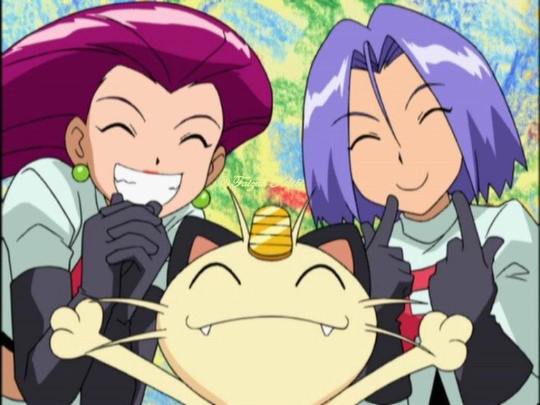
#pokemon#Pokémon anime#pokeani#team rocket#jessie and james#meowth#essay#kind of#character analysis#meta#is that what the kids call it?#j-psilas#my writing
333 notes
·
View notes
Text
there is just Something about the way queer people (trans people especially) tend to flock towards the eye, the vast, the lonely and the spiral,,
i mean, i know that the tma fandom is full of queertrans people, but if asked which of the fears they align with/would be an avatar for, a huge amount, if not the majority of them would choose the eye, the spiral, the lonely and/or the vast, and the more you think about it, the more sense it makes
the eye is unwavering knowledge, and a lot of us crave that certainty, that pure and exact understanding of ourselves and the world around us. queer, especially trans, nonbinary and aroace-spec people face so much self doubt because of the way society treats us and because of the misinformation and prejudice that runs rampant in the world. the idea of having completely accurate knowledge that we know without a shadow of a doubt to be true is very comforting. not only that, but in a way we share jon's fear of becoming a mystery, that after we are gone people will not know the truth about us, or see the complete story.
the vast is... well, just that: the idea that the world, the universe is so incomprehensibly vast that we disappear in it. that and the idea of drifting freely in the sky, unseen and therefore unjudged by everyone and everything, the thought that we exist as we are and no one/nothing immense/powerful enough to matter cares, it's all very appealing towards trans and nonbinary people especially because we feel like in such a space we can just be, without feeling self conscious of the fact that many people won't ever see us as who we are purely because of what we look like. we can let go of all these thoughts and doubts and that dysphoria, because, like us, it's too small to matter
the lonely is isolation, but there is a certain freedom to be found in the idea of isolation. we are alone, therefore we are not perceived, and therefore we are not judged or hated. we can completely lose ourselves in our thoughts and emotions, without fear of judgement or mockery or heartbreak, whatever kind of it. after all, no one can hurt you if you are the only one there...
and the spiral... the spiral is about doubting your reality, your sense of self, your perception of yourself, the very ground beneath your feet. the spiral is the embodiment of gaslighting, and a lot of queer and trans people not only have grown up being gaslit, but we are constantly being gaslit by almost everyone around us. how many times have we been told that the way we see ourselves is not real, that it can never be real, that we are delusional for even thinking it; "it's just a phase", "your real gender is what you were born as", "you can't see the truth", "you are misguided" are all things queer and trans people have heard and continue to hear every day of our lives. they are so deeply ingrained into us from the moment we are born that any act of self-expression that is outside of the norm feels like insanity, like delusion. we have to figure out our gender, which is confusing and difficult enough, and on top of that we have to wade through an infinite sea of self-doubt and self-hatred. not to mention that, in too many horror stories, "insane" queer and trans-coded characters are presented as the monster, the villain, and in these stories transness (and mental illness, which is something a lot of queer and trans people suffer from) are key aspects of this monstrousness. there is something comforting about a horror story where the scary villain is not queer trans person, or the queerness or the transness itself, but the things queer and trans people face every day that cause our pain and our suffering. the villain is the doubt that we are forced to carry with us every day
the magnus archives is clearly a queer, and by extension trans story, which is why so many queer and trans people love it so much and identify so strongly with the characters and concepts in it. we finally have a story for us, one that is compassionate and understanding towards our pain and our struggles
#can you tell i have many feelings about this and the magnus archives in general /rhet#i just have so much to say about being trans and tma#if anyone wants my take on other entities in relation to this: my asks are on do not hesitate to ask#i am Thinking Thoughts#tma meta#does this count as meta? it does now /lh /hj#the magnus archives#rusty quill#tma#queer#trans#horror#this is a huge topic and there is so much to say about this#especially about ace and aro spec people#but i chose to focus on queerness in general and on transness because well. i am queer and trans#i am an ally to aroaces of course but it's not my experience so i'm not as comfortable speaking about it in as much detail#the vast#the lonely#the eye#the spiral#the distortion#jonathan sims#i really enjoyed writing this wow#the fears#the entities#smirke's 14#the 14 fears
95 notes
·
View notes
Note
Top five problematic tropes from your favorite authors you'd want shot ala Old Yeller-style?
I don't know the name of many tropes so I will just describe what is common to happen and that I dislike. I am fine with most things and the problematic aspects depend more of the way something is presented than that element in itself.
1 - Paedophiles presented in a good light. This goes for Robin Hobb and her male adult characters that end up with minors way younger than they are. This is especially true for the character named Reyn, but Hobb uses this so much. Liveship Traders and Rain Wild Chronicles are the worst offenders. I also think "Fledgling" by Octavia E. Butler is going the same way, but I haven't finished yet. The excuse given is that this vampire that has the body of a 10 year old is actually 50 something so it's alright if full grown adults have sex with her (no, it's not. Not for me and I wish I didn't make movies in my head while reading). Honestly Butler has problematic content in her other works but so far it has always been well addressed so this one so far is really disappointing. "Daughter of the Forest" by Marillier also has a minor/adult relationship and so does "Fire and Hemlock" by Diana Wynne Jones. It's way too common especially in fantasy and I am begging authors to stop this bullshit.
2 - Consent is not sexy. Another Hobb one, but I like to think she got a little better at it given the character of Alise. A lot of female characters seem to not like men that actually care about consent. Althea is the main one that comes to mind for her reaction to Grag being careful compared to Brashen and their awful first time together that she apparently liked and it was so messed up. But, besides female characters there is also the shady situation of how Sedric's relationship with Carson started. Sedric did say yes, but I am not sure that counts as consent given that he had just attempted suicide and was in a vulnerable state, you know? The Xenogenesis trilogy by Butler also has a lot of consent issues but given the alien perspective and that the humans keep addressing the issue I don't find it as problematic there.
3 - No women left single/Everyone must pair up until the end of their lives. Hobb has this issue once again. Let women be single! Sometimes it doesn’t make sense for them to end up with the ones they end up with. This is especially bothersome and obvious in the Rain Wild Chronicles. There is also the fact that Fitz never seems to move on from Molly, ignoring the message of wiser characters like Kettle. The first love is forever is a really tiresome trope in fiction given how unrealistic it is in real life. Juliet Marillier absolutely has this problem too, but she writes romance and I think it happens even more often in those books. It’s not enough that the main characters have to end up with a man, their sister also needs to have some. Both often use the same love interest forever and ever and if something happens that separates them, they mourn their loss until the end of their lives and never fall in love again (unless first love interest was evil then it’s ok to be together with someone else).
4 - Queer/Queer-coded characters are evil. Look, I like a well dressed gay villain, but it’s a problematic trope. Why must the good guys be identified by wearing potato sacks? Hobb often makes her well-dressed characters evil and they are often queer-coded at least (Regal, Illistore, Dwalia, Hest, Kennit...). There are a few exceptions, but often if it’s noted that someone wears perfume and spends time caring about their clothes and hair they will turn out to be evil or at least not very nice at first (Malta, Sedric). This can include Terez from First Law because even if everyone in that world is pretty shitty, Terez often gets the worst end of the stick because not enough time was given for readers to understand her and she is just see as the men-hating lesbian. Meanwhile, the fans are still worshipping a mass murderer and a torturer. Then there are also people thinking Leo is the worst ever for what he did (even if that is on the fandom, but it’s still bothersome that 2 of the most hated characters in the fandom are gay). I can also include that one character from “Parable of the Talents” by Octavia E. Butler, even if he isn’t the main evil.
5 - Men and women can’t be just friends. If there is a deep friendship between opposite sexes it will more often than not lead to romance. I am not saying this doesn’t happen, but it doesn’t happen as often as fiction makes us think. I always had male friends. This makes me appreciate Rin and Kitay’s relationship in the Poppy War so much more because authors often refuse to let men and women be just friends. On the other hand, characters of the same sex can’t be in love. Are you joking? They have this deep bond because it’s the extreme power of friendship and nothing else. Who cares if that relationship is the most developed? Who cares if they are the first in each others’ minds? There is a character of the opposite sex waiting for boring interactions. I really had enough with this shit. Authors either learn to make characters of the opposite sex interesting and have a great dynamic with the love interest or just stop trying to force a character to be heterosexual, especially when it doesn’t make any sense that they are still hung up on a character they seldom see in their lives.
20 notes
·
View notes
Note
So a thought, somewhat inspired by reading your thoughts but also just in general. And is not meant to counter anything you’ve said, but an element of agreement with your thoughts I’ve not seen brought up, though I’m sure it has.
I think there’s absolutely a necessary place for analyzing villains from the perspective that villains in the real world are often heroic people being vilified. This is a reason there’s so much discussion over queercoded villains, because queer people being treated as social villains is a real thing we’re fighting throughout the world.
But it also means, often, believing that falsehood. By associating queerness with villainy, people associate villains with queerness (something that has been shoved down our throats for decades). But as necessary as it is to critiquing the real world, to taking a second to question whether the people we’re told are villains actually are, it still frames that dominant perspective as a truth. And then defense is villainy becomes as radical as defense of the marginalized.
But this subjugates the perspective of those who are treated as villains amongst the dominant culture. In many works, the hero isn’t amongst the dominant culture and is fighting against it. Which is VERY true of Scott McCall, but also so many other characters presented as the heroes of their stories.
In claiming the villains of these narratives are aligned with the real world marginalized activists and communities, the textual ties between the hero and the marginalized are not only erased, but also strengthens the perceived righteousness of the dominant culture and denigrates the heroism of the marginalized.
Sorry this reads as a very jumbled mess of words, but I think there’s a point to be made about marginalized creators who craft heroic allegories to their communities having those heroes be cast aside or worst vilified in favor of those that represent their oppressors.
I want to thank you for a very thought-provoking question. I would enjoy anonymous questions so much more if they were all like this one rather than being yet another visit from the Phantom of the Askbox.
If I may recontextualize your position in an attempt to understand it better: you believe it must be acknowledged that the label of villain is a social construct, and in the past, this construct has been identified with negative stereotypes connected to what are now defined as disadvantaged populations, such as LGBTQIA+ (examples of such as the sinister effeminate schemer, the sullen butch female bully, or the twisted transvestite), indigenous people (savage raiders from Westerns or bloodthirsty primitive empires), the disabled (body horror and deformed killers), among other examples.
Because of a historical trend in defining the villain by signifiers associated with the disadvantaged and because society has recently paid more attention to the treatment of the disadvantaged, your position is that part of the attraction to villains is due to an increased empathy for the very same disadvantaged.
My first counter though is that while many villains in fiction have indeed been coded with characteristics of the disadvantaged, they have just as often been coded with the characteristics of the advantaged if their villainy hasn't been straight out and intimately connected to those same advantages. For every simpering eunuch, there is a ruthless king. For every isolated freak, there is a self-indulgent aristocrat. There are villains who are vain beauties, greedy merchants, and spoiled children. Villains cover the spectrum of personality and station.
Therefore I would propose that the association of villains with disadvantaged people, specifically with queerness, is not so much a reflex as it is a tactic. It becomes emotionally permissible for fans to identify with the villain's actions and motivations if they connect said villain with a particular social injustice. It's more palatable if a villain sold out their family because their family did not accept their sexuality than if the villain simply felt unappreciated.
There is nothing inherently corrupt with employing that tactic, in my opinion, but it can be used in corrupt ways when the traits of the disadvantaged are assigned to the advantaged and used to excuse crimes. I'll talk about two examples though there are a lot more: Peter Hale (my personal hobgoblin) from Teen Wolf and Kylo Ren from the Star Wars universe.
I've seen many people try to position Peter Hale as an outsider, as excluded from his family and therefore occupying a disadvantaged position even if it is a position of responsibility (the Left Hand) and project queerness onto him. Canonically, there is no evidence for this. His romantic interests were exclusively heterosexual and there was no indication he was an outsider to his own family (his personal resources were kept in a safe in the Hale family vault, after all). He is a white multimillionaire who is the member of a family respected by other werewolves and who founded the city in which they lived.
Now, canon is not sacrosanct, especially when it comes to fandom, but in relevance to your idea, I have seen Peter Hale reimagined as queer, seen his motivations transformed into either a reaction to trauma or a reaction to injustice, but I have never seen his canonical hostility to his rival, an actual disadvantaged victim, reimagined by the fandom. In other words, whether Peter Hale is a rich, powerful, white male serial killer who has never had to work a day in his life or Peter Hale is a queer outcast, neglected and scorned by his insensitive family, his attitude toward his second victim -- the teenager he attacked, transformed, and terrorized -- never changes. That tells me that fandom's association of queerness with him is ultimately a superficial excuse for his behavior and not a true reconstruction of his character.
It's the same with Kylo Ren. For all the incredible and endless reinventions of this character as Ben Solo, abandoned and abused, while simultaneously keeping but ignoring his opportunities and his position. The fandom never gets around to dealing with his treatment of Rey or the destruction of the Hosnian Prime system and the billions of souls he helped slaughter. The application of disadvantage and the consequences of manipulation are seen as exculpatory if it is even addressed at all.
Villainy exists in the acts a character performs and not the acts performed on the character. That storytellers in the past took unnecessary and probably damaging shortcuts by signaling villainy with haphazard connections to disadvantaged groups is inescapably true, but I feel it's clearly not the source of the villain-stanning I've been witnessing. Rather, it's in the fantasy of being able to rule and hurt others with impunity, even if the villain's victims have a legitimate right to deny those actions. Associating the right of privileged villains with the consequences of being in a disadvantaged group like queerness serves to assuage the fear of the valid disapproval of society who see villainous actions as undesirable.
24 notes
·
View notes
Text
So I watched House of Wax 2005 for the first time last night and I have Thoughts
(Spoilers follow)
First of all, the premise is pretty obviously heavily ableist—even with the twist of “oh the ‘deformed’ one isn’t actually the evil one,” it still pretty heavily leans into the “evil from birth” trope, and still used Vincent’s appearance, autistic-coded behavior, and mutism for shock/horror value. But, this movie for me is like with queer coded villains: yes, it’s intended in a way that would be offensive, but I identify enough with the characters that I like it anyway, even if I wasn’t *meant* to identify with or like them.
Alright, so with that disclaimer out of the way:
What is the actual backstory of the Sinclair brothers? I’ve read a fair bit of meta this morning and much of it is discussing the disconnect between Bo’s story and the actual funeral setup, as well as pointing out that Bo is *probably* lying at least a bit, just because I really don’t think he’s the type of character who would tell the full truth about anything. And he doesn’t even mention Lester, which also points to him misrepresenting the real story.
The way I see it, I think there are a few elements of truth in his story. Doc Sinclair was an actual medical doctor, who did perform the surgery on Bo and Vincent. Doc Sinclair did die from a gunshot wound. Trudy was an actual semi-famous wax sculptor. I think she likely was indeed chained to her bed at some point, and is definitely now dead.
We see that Trudy and Doc were physically abusive towards Bo. I mean, Jesus. Poor kid is having a meltdown and you force him into and strap him to a chair and hit him? I don’t have a lot of sympathy for Trudy, whatever happened later.
I think Bo did become physically violent as a kid, and I think he ended up killing Doc when he was a teenager. Which might well have been in self-defense, and so have been justified. But Trudy, who always saw him as a monster, would have sent him to an asylum for it, and so he drugged her heavily using some of Doc’s supplies and chained her to a bed in her room, like how she had chained him so many times.
He told Vincent that she had developed a brain cyst and that their father had killed himself upon finding out. Since Trudy was drugged and unable to speak coherently, it was easy for Vincent to believe Bo that she did have a degenerative brain cyst and needed to be kept chained for her own safety. They kept her like that for many years, as the twins grew into adults and Trudy grew old, eventually dying. Vincent at first cared for her quite tenderly, feeding her and providing palliative care. Bo would be much crueler to her when Vincent wasn’t around, and I think that’s part of what led him further down the path of violence-for-fun—-you have this woman who was abusive to you your whole life, now a prone victim. Of course he took out his frustration on her. And learned that he enjoyed doing that.
Meanwhile, poor Lester was only a couple of years old when this first happened, and so he grew up very neglected and spent a lot of time wandering through the woods. The Sinclair twins took care of him as best they could, which frankly wasn’t very well. He always was a nice enough kid (well, relatively speaking), and he identified a lot more with animals than with people, since Bo and Vincent were the only living people he knew for very long growing up.
All three of them have trauma out the wazoo, with Vincent growing up believing that being quiet and perfectly compliant are the only ways to be loved (after all, look what happened to his brother who wasn’t quiet and well-behaved), Bo growing up believing that he was a monster and would always be hated no matter what he did so he might as well act out and give people a reason to hate him, at least that way he’d have *some* control over it, and Lester growing up with some truly terrible role models and probably believing that if he ever got sick or became a nuisance to his brothers he would be chained up just like his mom was.
As for whether Trudy started killing people before she herself was chained up and eventually died—I don’t think so, no. But she did have plans for a “town of wax” tourist attraction—which is actually why Ambrose is so deserted now, she bought the entire dang town to turn into a wax theme park of sorts and everyone who had lived there had to move away (rich people, yikes). Bo figured the best way to keep Vincent loyal to him was to convince Vincent that by helping Bo kill people, he was actually helping his mother create her dream of a town of wax. Vincent wasn’t the one who first started killing people—at first he just helped Bo to cover them with wax and pose them around town. I actually think the first person they did this to was Doc Sinclair, after Bo had shot him and framed it as a suicide, and Bo framed this as a way to honor his memory. As time went on, Vincent began to care more and more about his art and “finishing his mother’s dream” until he was every bit an equal participant in the murders with Bo, and even enjoyed them, in an artistic/scientific way. I don’t think he’s quite the sweet innocent victim that fandom sometimes sees him as—that takes away his agency and infantilizes him a bit, and he is an adult who is capable of making his own choices. I think he chooses to keep killing, because it satisfies him, and making the sculptures from their bodies provides him with a purpose in life. He’s not as culpable as Bo, but he’s hardly innocent. Of course, I think Trudy is the real villain in all of this, but I’m sure she had her own reasons for acting like a shitbag, too. The question of blame is muddy in this movie, like in most good horror movies (and in real life, honestly). But regardless, there’s one thing we can all agree on:
Sinclair twins hot 😳
18 notes
·
View notes
Text
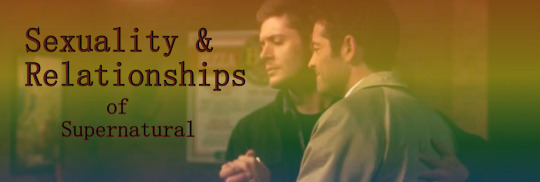
This project began as an indirect response to a few negative tweets in the days following the Valentine's Day Destiel wedding. During such time that “certain sources” chose to speak against the impromptu "wedding" and state that the direction of the show never included sexuality or romance. Since this argument has sparked a bit of discourse as to the validity of Dean Winchester and Castiel's relationship and sexualities, I began this edit as an exploration of observations throughout the entire 15 season run of the series. (That's not to say that Sam does not also have his own impactful romances throughout the show -he does have several notable ones- but in his case they are never debated upon or erased.)
There are three complete edits linked below. The differences are explained in their descriptions. (I also recommend downloading for best quality rather than simply watching in the browser, but it’s your choice)
BiDeanEdit: (Click here to download)
Runtime: 18:04:44
File Size: 10.0 GB (10,741,415,805 bytes)
Series long compilation edit (in sequence) of Dean Winchester and Castiel’s relationships and intended expressions of their sexualities (ie interest in both genders). This edit focuses on their relationship as it develops with one another, their other notable relationships (DeanxBenny, CasxMeg, DeanxLisa, etc), and the framework around their sexualities with small scenes of expression (ie Dean in ‘Playthings’ or ‘Everybody Hates Hitler’, or early seasons Dean & his transgressions with women, or Cas in ‘Caged Heat’)
BiDeanMLMEdit: (Click here to download)
Runtime: 14:40:57
File Size: 8.05 GB (8,649,798,685 bytes)
Series long compilation edit (in sequence) of Dean Winchester and Castiel’s relationships and intended expressions of their sexualities. This one is the same as the last but with only MLM content (Otherwise referred to as ‘only the gay parts’). We focus on this more repressed side of their sexuality and see these clues laid out altogether in one fluid edit (these examples are also available in the previous edit, however are just not aligned beside any heterosexual content). DeanxCrowley, DeanxBenny, DeanxLee, DeanxCas, etc.
DestielOnlyEdit: (Click here to download)
Runtime: 13:08:49
File Size: 7.17 GB (7,709,560,696 bytes)
Series long compilation edit (in sequence) of only Destiel related content. The same as the above edit, just simplified even more to only focus on Dean and Cas’ relationship over the years.
Keep reading below to find my full analysis of the complete edit regarding these guys sexualities, relationships, and the parallels we can draw.
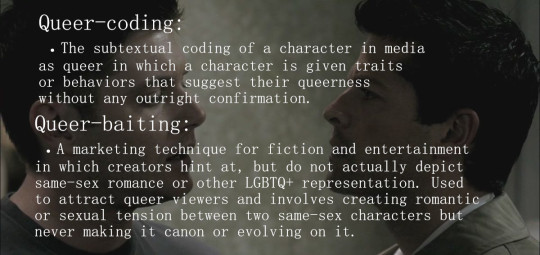
To understand why it is that so many queer fans of Supernatural and other similar shows read queerness in characters and their relationships, we should look at the hays code established in 1930. At this time this certain code was established to monitor what was allowed to be depicted outright on film. Within the margins of what was to be stifled, was homosexuality. As such, filmmakers had to plant “queer-coded” seeds into the writing and subtext so that queer audiences watching could interpret these characters and relationships in this manner without the words and actions stating so outright. (At this time homosexuality could be depicted on film as long as said gay character was either a villain, caricature, or met an untimely end- feeding into the blossoming of the kill-your-gays trope. But that’s another topic for a later time.)
As film changed over the years and times became more accepting of lgbt characters portrayals on screen outside of simple coding, this did not make the code obsolete. Queer-coding and queer-baiting are often used in media in present day as a way to pull in viewership. Networks are able to garner the best of both worlds, in a sense. They can draw in heterosexual audiences that may not want to watch queer media, whilst also drawing in queer audiences by coding some characters and relationships just enough to pull those viewers in. This works simply because there is such a lack of queer representation in most media that we’ll take what we can get.
This is where Supernatural comes in. There is a reason that Supernatural and thus “Destiel” is known by some as “The Great American Queerbait.” This twelve years long gay slow-burn between one overly masculine character and his awkward angel best friend did not begin with the intention of romance or baiting, as many of these things generally don’t. However, once fans realized the chemistry between these two particular actors and characters, it became something blatantly written into the show. Sometimes jokingly, other times as legitimate moments of emotional intimacy between two characters. So to say that the show’s direction never included sexuality or romance is, to put it bluntly, bullshit. Just because something is not written in clear and concise wording right in your face, does not mean that it is nonexistent and that the writers did not know what they were writing into the show. (Not even to mention the actual love confession in 15x18, but I digress).
We know very well that queer content has been written subtextually into media for the better part of seventy years. It is a language in media just as much as lighting is a language, just as much as certain camera angles, color design in costumes or set decor, and music design are languages. All of these, outside of the simple words said on screen, make up our media and these characters and our shows. Tv is a world of color, not black and white.
[[ further readings on the above topics: X X X X X ]]
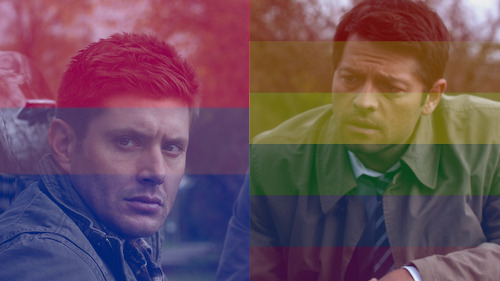
I decided upon this full edit encompassing both the female and male aspects of Dean Winchester and Castiel’s relationships & sexualities because oftentimes when we’re looking into potentially queer characters we tend to focus on the same sex attraction and neglect the opposite sex attraction. Both are very important to acknowledge and compare, if at the very least to view where they may overcompensate, where toxic masculinity may come into play, compulsory heterosexuality, trauma responses, etc. Sometimes what a character doesn’t do is just as important to interpret as what they do do.
For instance, Dean Winchester. If we are to operate under the assumption that he is bisexual, any repression we witness throughout the series as to his male attraction is likely to be a result of his difficult upbringing, similar to most queer identifying people with childhood trauma. His father is a marine, the picture of manliness in which Dean himself blatantly embodies in an effort to impress and make his father proud in any way he can. Dean is already unlikely to seek out activities in any aspect of life of which might make John look at him in a different light (ie, in an every day setting, even simply watching Finding Dory- this is not something S1 Dean would have admitted to liking, but we see Dean in later seasons standing up for himself and his appreciation for it).
Is it perhaps for this reason that we see Dean as an overly blatant and flirty ladies man in season 1 when John is still alive, while this side of him steadily declines as the series continues? It even becomes established in season 3- in light of Dean’s fears surrounding going to Hell, he enters an attitude for coping that Sam recognizes- hypermasculinity, promiscuity, deflection. Heightening the idea that this caricature of himself that he embodies is a mask that he wears in order to cope with something else. He is donning the image he assumes others think he should fit into. Sam calls him out on this through the years, and eventually this becomes something we see in him less and less as he feels more comfortable simply being himself.
If we take into account the time of which this first season is filmed, this is 2005, a time where gay jokes were still funny and an overcompensating character was a joke attached to it. We see Dean built up in these first couple of seasons through this lens of jokes about a hyper-masculine character being mistaken for gay, however instead of this building up the masculinity to encourage a raging heterosexual characterization, this overcompensation is exactly what inadvertently sows the seeds of queer-coding. To queer watchers this reads as a deeply repressed character with childhood trauma who overcompensates when faced with observations of gayness and uses hypermasculinity to counteract these accusations.
It is through circumstances such as “Bugs” in S1 or “Playthings” in S2 that we first see these ‘jokes.’ The brothers are mistaken as a gay couple. Dean being the more “masculine’ of the two characters has a blatant reaction to these situations (Overcompensating), and Sam’s lack of a reaction is what solidifies his own straightness all the more. Neither brother is homophobic (this becomes established as time goes on) so why would either have a problem with this mistake? Sam wouldn’t care because he’s clearly not gay- in fact, he usually just laughs it off. Dean would care because he wonders what about him looks gay? Do other people see it too? Do they know? What’s wrong with him?
We also see another blatant example of this type of freakout in season 8. “Everybody Hates Hitler.”
(Images: “Playthings” S2xE11)
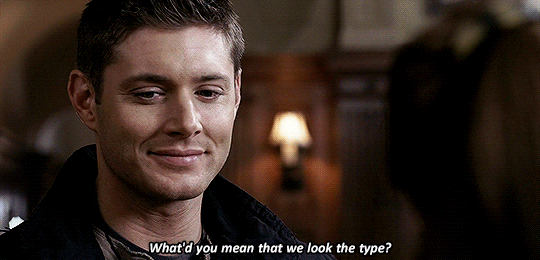
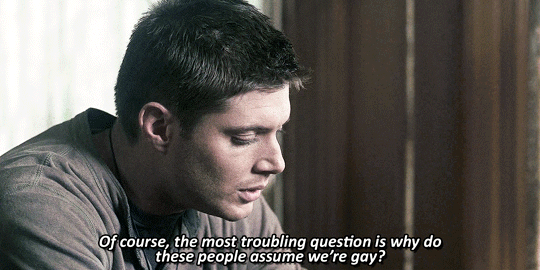
(Image below: S8 “Everybody Hates Hilter”)
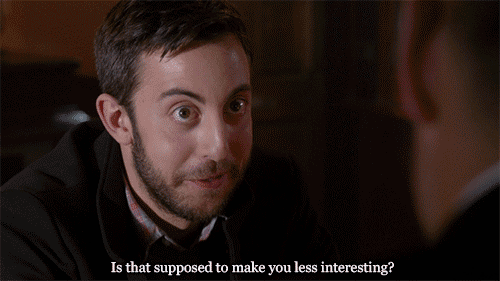
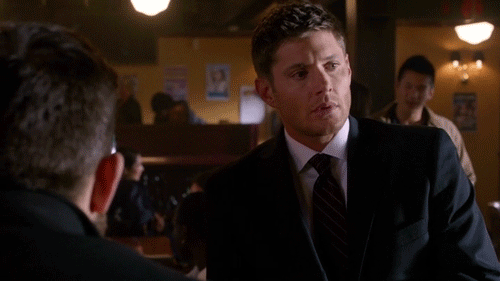
We frame these situations in early seasons around girl of the week scenarios and brief bar flirtations. Have to make it clear that our manly straight character looks as manly and straight as possible. Dean is also in his 20s, he’s more carefree/not as traumatized yet, and he is a sexual man so he does sleep around quite a bit. What is notable, however, is how much this drops off in later seasons. As time goes on Dean seeks out less and less the fleeting encounters of one night stands, in favor of genuine connections- even if he himself frequently doubts his own ability to ever have a settle-down type of relationship or life. Lisa is the only long-term female romantic relationship Dean ever has throughout the series run, and this tentatively begins in season 5 and ends in season 6.
Dean and Lisa’s relationship is founded more in a dream of something that Dean wants to be rather than who he actually is. Although he loves her, their bond is made through trauma and their relationship overall is reminiscent of a soldier who returned home from war with heavy PTSD and begins to burden the family that he will come to realize he doesn’t quite fit within anymore.
Outside of this, his closest relationships from thereon out are between Benny, and Castiel.
Let’s start with Benny. Throughout season 8 Benny is framed as an ex and his relationship with Dean directly parallels Sam and Amelia’s. Both brothers must confront their relationships with their ‘significant others’ and decide whether to cut them off or proceed. Both brothers found these people under circumstances in which they did not get along with them at first but were pushed together. Another person comes in the middle of their relationship (Amelia’s husband for Sam, or Cas/Sam for Benny). The brothers each resent the other’s significant other or the circumstances surrounding the relationship. Sam hates Benny because he is a vampire and Sam does not understand why Dean continually trusts him (which is a circumstance inherently queer-coded in itself for comparability to an unaccepting family). Dean does not care for Amelia simply for the fact that Sam chose her over looking for him in purgatory.
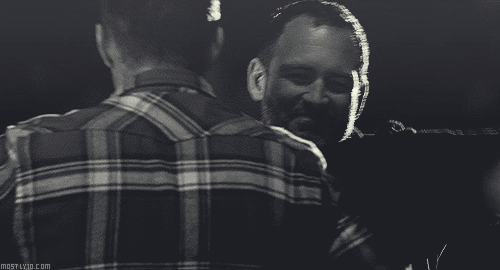
Other instances we see parallels between Sam’s romances and Dean’s:
“Sex and Violence” S4 siren: Nick(Siren)/Dean parallel to Sam/Dr Lady
Season 4: Ruby/Sam and Cas/Dean teamup parallels
S1 Dean pulling Sam from the fire away from Jess vs S12 Sam pulling Dean away from Cas who may die approaching Lucifer to fight
Season 8: Dean/Benny vs Sam/Amelia. Dean and Benny, since they’re essentially going through a breakup, are directly paralleled to Sam and Amelia and their breakup. See “Larp and the Real Girl” for Charlie and Dean’s conversation about Sam’s recent breakup and Charlie picking up on the fact that Dean might also be going through one.
1x05 vs 8x07: Sam seeing Jessica on the sidewalk as they drive down the street vs Dean seeing Cas on the side of the road as he drives down the street
S11: Perhaps this one can be interpreted loosely and not necessarily romantic (esp on Sam’s end), but “O’ Brother Where Art Thou” both brothers are drawn to forces they actively fight against being drawn to. SamxLucifer and DeanxAmara.
S11: “Beyond the Mat” not a relationship but with crushes/infatuations. Dean with Gunner Lawless and Sam with Rio.
S15: Cas telling Dean that “We Are” real. vs Eileen being unsure what’s real and Sam kissing her and saying “I know that was real.”
S15: “The Trap” Dean loses all hope following the death of their friends and primarily Cas. Sam loses hope after Eileen’s death. Directly paralleled in the episode. (We also see Sam lose Eileen in 15x18, where Dean also loses Cas)
Additional parallels between Dean/Cas with anyone else:
Season 9/10: Cain/Colette vs Dean/Cas. “She only asked for one thing. To stop.” vs Cas asking Dean to “Stop”. Both circumstances referring to the Mark of Cain.
S12 “Lily Sunder Has Some Regrets” Lily (human)/Isham (angel) vs Dean (human)/ Cas (angel)
Led Zeppelin: This music means something within John/Mary’s relationship, which Dean directly acknowledges in 12x01 with Mary. We find out Dean has gifted Cas a mixtape of his “Top 13 Zepp Traxx” in 12x19. (the implications of Dean having made a mixtape for Cas, being its own point in a different discussion)
When Lucifer contacts a person to try and get them to open up to him, he uses their dead lover as a ploy. SamxJess, NickxSarah, VincexJen, DeanxCas - 15x19 when Lucifer calls Dean using Cas’ voice.
The parallels of unreciprocated love/infatuation. DeanxCrowley and CasxHannah. Dean likes Crowley but clearly not the way that Crowley likes Dean. Cas likes Hannah like a friend or sister, but she keeps putting the moves on him for awhile and he appears deeply uncomfortable and has to shoot her down more than once.
Parallels between Dean’s own relationships:
Dean in “Let it Bleed” torturing demons to find the location of Lisa and Ben vs Dean in Purgatory torturing monsters to find the location of Cas “The angel”
“The Rapture” opens in Dean’s dream which Cas visits and says he’s in trouble and gives Dean an address to go to immediately. “The Song Remains The Same” opens in Dean’s dream which Anna visits and says she’s in trouble and gives Dean an address to go to immediately.
S6 Dean dodging calls from Lisa vs S12 Dean dodging Cas at the beginning of “Lily Sunder Has Some Regrets” (notable also how Sam treats both circumstances the same)
S11: “Into the Mystic” 11x11 Mildred tells Dean the key to living a long and happy life is to follow your heart. Later in the season “All in the Family” 11x21 When Casifer is still captured by Amara, she puts her hand to Cas’ heart and is able to connect with Dean to contact him. Hinting at the link between Cas and Dean’s “hearts.”
Not necessarily a parallel but an observation. 7x01 when Cas is loaded up on God juice, and Dean has given up but Sam hasn’t and wants to talk to ‘the guy’, Dean says, “He’s not a guy, he’s God.” But in 11x18 Dean refuses to give up on Cas and let him continue to be possessed. Sam keeps speaking about Cas like he’s just a vessel and Dean says, “It? It’s not an it, Sam. It’s Cas.” Mostly this shows the development of their relationship and Dean’s willingness to continue to fight for him.
Dean’s dream world with Pamela in S14, she says to Dean “How come you only want what you can’t have?” and in S15 during Cas’ confession scene he says to Dean, “The one thing I want, is something I know I can’t have.”
Before we delve into Dean and Castiel specifically, let’s explore a few more things regarding Dean.
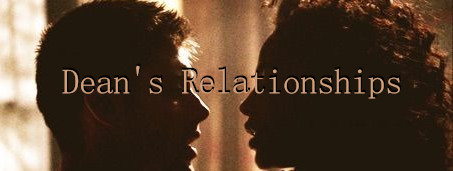
Let’s start with Cassie. This is Dean’s first romantic relationship we see on the show, and is arguably his first love. What is notable about her is her characterization and Dean in relation to her. We haven’t seen him in a relationship before, and thus this is the baseline to which we can draw how he is in this type of vulnerable state.
We see here that he is drawn to strong individuals. Cassie is a very strong willed character and can hold her own. She has a boldness about her. Dean appreciates that. We see similar in his next framed love interest: Jo Harvelle. Jo is another strong character, and though Dean sees her more as someone he needs to protect because she doesn’t have as much experience under her belt, he respects her intellect and strong will all the same. They connect through a love for hunting and mutual daddy issues. Personally, this is a relationship I view more as a little sister dynamic in a similar vein to Dean and Charlie, however this pairing is still worth noting because as it was written it was intended to potentially flourish into a romantic relationship. This did not pan out, though the seeds are still there.
Next up is Anna. Again daddy issues are a solid connection these two hold, and while this relationship is more of a one-night-stand than anything else, there are still important points to be taken from this encounter. The first is just how much Dean cares. We don’t see very many sex scenes with Dean throughout the series, but of the ones we do see, it is apparent that he is a gentle and tender man. He cares. About even a single night with a woman. (Cassie, Anna, Lydia ’The Slice Girls”) This is a contrast to Dean’s general persona of the masculine straight promiscuous lady’s man. He has all the bravado of a man who ‘loves em and leaves em’, but in reality that is not who he is. This is another example of the faces Dean wears in front of certain people (and what he thinks they expect of him), and the person he is once he lets that mask fall.
It may be important to note as well that Anna, (it is rumored) was originally meant to be more to Dean than this simple one night stand and connection. She was intended to become a romantic interest but, as it turned out, Dean and Cas had more chemistry so the arc that Anna was meant to follow was instead given to Castiel.
It is another year until the apocalypse comes along, Sam dies, and Dean falls back into Lisa’s lap. While Lisa is another strong-willed woman who rolls with the punches, her lifestyle deviates from Dean’s usual romantic interests simply because of her offering of a normal life outside of everything he’s usually known. A life with her is dipping his toe into a life he could have had if he didn’t hold the weight of the world on his shoulders and hunt the things that go bump in the night.
This is Dean’s last “official” relationship of the series. After putting Lisa and Ben in danger by being someone that he cares about, Dean accepts that he’s simply not a guy that can have a normal life or a normal family. He cares about people and they get hurt. This is a weight he holds on his shoulders for the remainder of the show. He loves someone, or more accurately, they love him, and they’ll get hurt. End of story. It doesn’t help that immediately following this, Castiel “dies” too.
Maybe it’s Lisa, maybe it’s Cas. Maybe it’s a combination of the two at this point in time, but Dean is never again the same when it comes to relationships after these events at the end of season 6. He becomes more cautious, tries to keep people an arm’s length away, and we even begin to see less and less promiscuity and flirting with miscellaneous women from this point on.
Let’s talk about Castiel.
Although Dean has had various queer-coded moments throughout the beginning of the series and up to Castiel’s entrance in season 4, his minimal relationships up to this point have all been with women. Simply exploring the evolution of this relationship from Dean’s side of the picture, Dean doesn’t start to truly warm up to Castiel until perhaps the end of season 4. He begins the season unsure of the angel, perhaps even a bit afraid of him, before the two garner a sort of mutual respect as Dean begins to see that there’s more to him than simply an agent of heaven.
They’re friends in season 5. The quirky, strange angel that doesn’t understand social cues, stands too close, stares too much, and says things like “we’re making it up as we go” and “tonight you’re my little bitch.” He’s a far cry from the ethereal entity that showed up in Bobby’s kitchen just a year ago and threatened to toss Dean back into Hell. What really turns the curve, however, is “The End.”
5 years in the future in the midst of an apocalyptic war, Cas is still around. He’s human and he’s stuck by Dean’s side through it all, even though this Dean is just a shadow of his former self. Then again, so is this Cas. But still, they stuck together. Dean isn’t used to that. He has very few people that have stuck by him for this many years. Could probably count them all on one hand at this point. Bobby and Sam at the top of the list. Everyone else either dies or leaves. And in this future, Bobby and Sam are dead, but Cas is still there.
Dean has abandonment issues. His mother died when he was four, his dad was in and out emotionally and physically his entire upbringing, Sam left for Stanford the first chance he got. He’s got strings of dead friends and lost relationships surely in tow for years at this point, and half the time Dean has become accustomed to pushing people away before they have a chance to push him away first. (Ie Cassie, Lisa, often even Sam too at times). Cas won’t make these issues any better during their run together, but up to this point Cas hasn’t let him down. The simple fact that in this one future universe Cas had stuck by him, I’m sure that makes a big difference to Dean and actually may be imperative for their relationship going forward and the trust that forms between them.
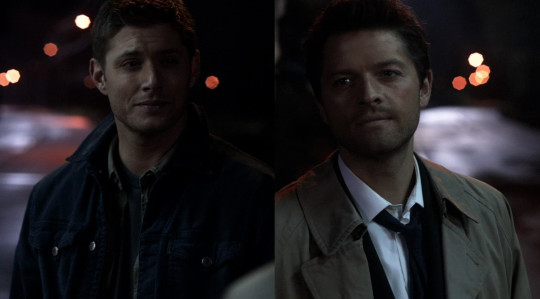
Something that becomes a large part of their relationship is Cas and Dean’s ability to have conversations with just their eyes. This is a shorthand that Dean is known to have with Sam on occasion, especially during times of combat. It takes a certain amount of intimacy and knowledge of the other person to be able to have a shorthand like this. The first instance we see this between them is quite possibly “It’s the Great Pumpkin, Sam Winchester,” when Dean convinces Cas that they can save the town. We see it again in the ‘beautiful room’ when Cas slams Dean up against the wall and Dean seems to understand what’s happening. Another instance, “The Song Remains the Same.” In a way, it’s a locking of eyes that just seems to say “trust me,” and they do.
Sam wonders if Anna may be right. If killing him and scattering the pieces will stop this whole Lucifer vessel business. Sam asks Cas, Cas looks to Dean, they share a look, and Cas shuts Sam down. In all likelihood that plan could have worked, but Cas wouldn’t do that Dean. He wouldn’t do it to Sam either but at this point he’ll do anything at all for Dean.
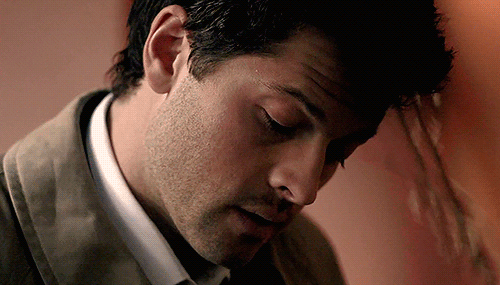
If we take a moment to consider Dean and Cas’ relationship here, it is unlike any of Dean’s previous ones. Dean never has this same kind of shorthand with any of his other relationships, save for possibly Benny to a certain extent. Cas is an odd guy, and Dean frequently describes him as such, but he finds it endearing (if “Free to be You and Me” is any indication this early in their relationship). The previous women in his life all had the same thing in common, that they’re strong willed, brave, and don’t put up with Dean’s shit when he’s being a shit. Cas does fit all this criteria, but he’s also someone that Dean has a hard time reading. Cas is so literal sometimes that Dean can’t tell what’s literal, what’s deadpan, and what’s just Cas’ personality as an angel. But at the end of the day, simply put, he likes him and he trusts him. Getting Dean Winchester’s full trust as quickly as Cas gets it is an anomaly all on its own.
Dean’s female relationships are fairly surface level. They’re easy and fairly uncomplicated. Boy likes girl, girl likes boy. Girl gets mad at boy, relationship ends. Easy. Expected. His relationship with Cas isn’t easy. But the big endgame relationships seldom are. There’s blood, loss of trust, rebuilding, and there’s a pull that at the end of the day always brings them back to one another no matter how incredibly messy things get.
And boy do things get messy. If we touch back into the end of season 6 where things end with Lisa and blow up with Cas, Dean is at an all time low in the relationship department.
Dean takes Cas’ betrayal hard. Breakups are one thing. Leaving Lisa was expected. It was bound to happen eventually. Dean always knew that somewhere inside. He mourns leaving them, but knows it’s for the best. But with Cas’ betrayal at working with Crowley, he’s devastated all over again.
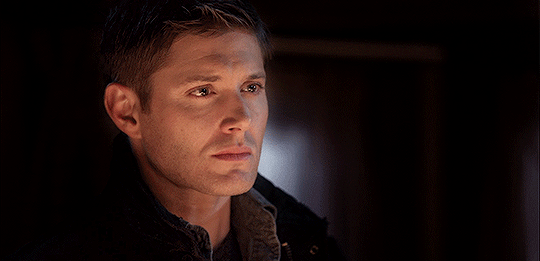
Dean never expects his relationships to last forever, but again there’s a choice few people in his life he lets take up space on the list of those who might stick around. Bobby, Sam, Cas. I don’t think Lisa was ever on this list, as much as Dean wishes he could tell himself she and Ben were. But they weren’t. That relationship was a ticking time bomb. And when they nearly die because of his life and the creatures surrounding him every day, that’s the end of it.
Fast forward, season 7 is a time of mourning. He’s lost Lisa and Ben, he gets Cas back for all of 30 minutes before losing him all over again and never being able to repair that relationship. But he keeps the trenchcoat. Fishes it out of the lake, bundles it up, and keeps it in the back of every single car that he and Sam drive that year.
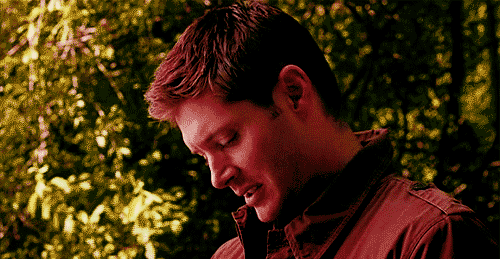
Dean doesn’t keep mementos. Not of Cassie, not of Jo, Not of Anna, or even Lisa and Ben. No pictures, no items, just memories. You know what he does keep? He keeps his dad’s leather jacket, Bobby’s flask, pictures of he and Sam and his mom. Is keeping the trenchcoat in the back of the car for a year similar to those familial keepsakes? Maybe. But it’s also more than that. It’s covered in blood and lake water, and I’m sure Dean would explain it away that Cas was family and that’s why he kept the coat. Probably even believes that too.
Then we have purgatory.
Dean prays to Cas every night. He could get out of that place just on his own, but he stays there for months in full combat just to look for the angel and get him out with him.
“First we find the angel”
“Cas, we’re gettin’ out of here. We’re going home.”
“Cas, buddy, I need you.”
“Let me bottom line it for you. I’m not leaving here without you. Understand?”
“Cas, we’re gonna shove your ass back through the eye of that needle if it kills all three of us.”
“It’s gonna work. Nobody gets left behind.”
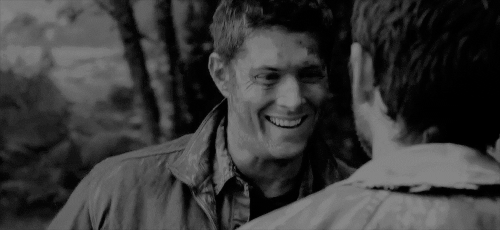
When we meet Benny, Dean’s only other primary male pairing of consequence, he is not trusted. This team-up is one of strategy and a mutual goal only- at least at first. Dean and Benny fight well side by side, but the trust only runs so far. That is, until during one particular fight with leviathans in which Cas nearly bites it, Benny saves the angel’s life. This is the main turning point for Dean’s entire trust in Benny from here on out.
“Benny has never let me down.” Dean says later to Sam. And he never did. He saved Cas, got Dean out of purgatory, and then later on he gets himself sent back to purgatory just so he can help Dean’s brother get out of there.
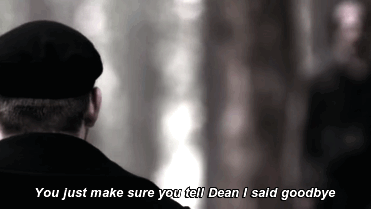
Dean and Benny’s relationship was “pure” in purgatory. They didn’t have to worry as much about the fact that Benny was a vampire and Dean was a hunter, they were just brothers in arms who earned one another’s trust, respect and love. There’s no way you let a man kill you and send you to purgatory to save his brother if you don’t love him.
Their relationship once they broke out of purgatory is where things began to sour, not because of anything either of them did to the other, but more the space they let grow. Regular Earth was different from purgatory and these men had to go back to their roles and say sayonara. “What happened in purgatory stayed in purgatory” and all that. Benny was a vampire and Dean was a hunter. That kind of thing mattered here despite the fact that they did care for one another.
Dean and Benny’s tumultuous relationship in relation to the people in Dean’s life could be reminiscent of a queer experience in itself. A lack of acceptance from Sam, Bobby, Martin- Dean’s family. Not because of who Benny was, but what he was. Pair this with the already established fact that Amelia and Sam were a direct parallel to Dean and Benny, Season 8 has been one of the most blatantly queer-coded seasons as of yet.
Which brings us to “Goodbye Stranger.” It is established early on this season that Dean feels that there’s something wrong with Cas, something off about him. The fact that they don’t know how he popped out of purgatory is just one part of it. It’s in the way he acts, how spacey he is, the fact that he doesn’t answer Dean’s prayers. “I always come when you call.” Cas once said. And he did. Until now.
This is another aspect of their relationship which is simply there and not spoken about much- similar to their staring and eye communication thing they do. Dean started their relationship unable to read all of Cas’ quirks very well and unsure of the guy. Now, he’s fluent in the language of Cas. He knows by tone of voice, by shiftiness, by his expressions- when something is up. Maybe he started paying more attention after the whole Rafael situation until he could read Cas like the back of his hand, or maybe he just started paying attention just to pay attention.
He’s known something is wrong for months while Cas has been under Naomi’s control. Just the same as years later, he knows something is up when Lucifer is taking a ride in Cas’ body. And he knows in 12x15 just by the way Cas speaks on the phone that something is off with him.
They come upon the angel tablet in the crypt, and Dean does fight back when Cas starts in on him, but he spends even more energy trying to get Cas to come back to him and fight whatever force has him under control. He never once stopped to think that this was just Cas. “This isn’t you! Fight this!” Dean would repeat over and over as Cas beats him nearly to death.
There was a moment he certainly thought that Cas would kill him, and it seemed like he was more bothered by the fact that it was Cas that would do it more so than the thought of dying.
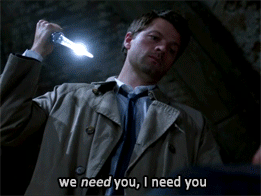
Cas breaks through the mind control, heals Dean. Then he leaves. So, again, Cas leaves. He keeps doing that to Dean. I stated before that Dean’s abandonment issues come into play in this relationship, but unlike at the beginning where Dean saw a future that Cas stays in, this Cas keeps coming and going. This makes it difficult for Dean to trust him fully, to rely on him. But the fact of the matter is that he does still trust him completely, and that’s what bothers Dean.
When Cas does come back again, collapsed and bloody in the middle of the street, Dean puts up a wall. He’s hurt and he’s tired. He doesn’t want to trust him as much as he does and he definitely doesn’t want him to keep coming and going without a thought. (What’s interesting to note here, though, is Dean’s change in character as this occurs through the years. Because while here he may simply give Cas the cold shoulder and not talk much about his hurt in this situation, we see later on in 12x19 after Dean has been fretting for days about where Cas has gone off to, and Cas finally does return, he voices his side of things. “With everything that’s going on, you can’t just go dark like that. We didn’t know what happened to you. We were worried, that’s not okay.”)
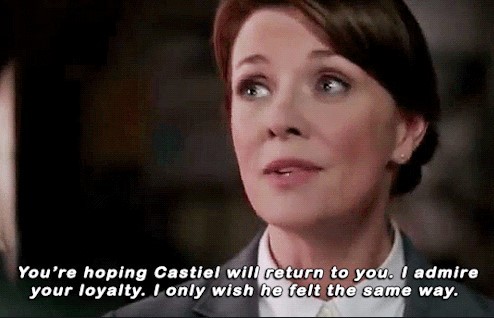
Naomi hits the nail on the head when she visits Dean after Castiel disappears and she notices Dean still hasn’t warded the boat against angels. It is moments like these that we realize just how much everyone else around these two also notice their chemistry and their deep devotion to one another, always seeming to fall back to one another.
“I think you have me confused with the other angel. You know, the one in the dirty trenchcoat who’s in love with you.” - Balthazar S6
“The stench of that impala is all over your overcoat, angel.” - Crowley S6
“Castiel? Oh, he’s not here. See, he has this weakness. He likes you.” -Uriel S4
(to Dean) “Go ask him, he was your boyfriend first.” - Meg S7
“I have tiptoed through all your little tulips. Your memories, your little feelings, yes. I know what you hate. I know who you love, what you fear.” - The Empty S13
“And then after a rousing speech, his true weakness is revealed. He’s in love... with humanity.” - Metatron S9
“I’m sorry, did you just say that you lost a Winchester? Because, one, that’s... interesting. And, two, how is it that you lost Dean? I thought the two of you were joined at the... you know, everything.” - Kipling S14
“And for what again? Oh, that’s right, to save Dean Winchester. That was your goal, right? I mean, you drape yourself in the flag of heaven, but ultimately, it was about saving one human, right? Well, guess what? He’s dead, too.” - Metatron S9
“Don’t lose it all over one man.” - Hannah S9
“The very touch of you corrupts. When Castiel first laid a hand on you in Hell he was lost!” - Hester S7
“Oh, sweet. Almost anything. Castiel? He’s dead. All the way dead. Because of you.” - Miriam S13
“And then you’d kill the angel, Castiel. Now that one, that I suspect would hurt something awful.” - Cain S10
“He should know this- Lucifer, his favorite, isn’t doing so well. Say nothing of the vessel, your friend Castiel.” - Amara S11
“I’m gonna cure you of your human weakness, the same way I cured my own. By cutting it out.” - Isham S12
Bonus: Dean to Sam about Garth’s baby Castiel- Dean: “This Cas keeps looking at me weird.” Sam: “So kinda like the real Cas.”
It is time and again that opposing forces recognize the relationship between Dean and Castiel, and it’s commented on and used against them frequently.
As we move forward to the angels falling and human Castiel, this season opens up with dean in the hospital with a very ill Sam. The first thing he does before contacting anyone else is pray to Castiel. There’s a moment in 9x03 where Castiel walks into a church and speaks with a woman there. He expresses his lack of faith and she says, “I guess that’s why we pray. You need something stronger than yourself.” Dean never prayed until he started praying to Cas. He prayed to Cas during the apocalypse, in purgatory, when Sam was sick during the trials, now in this hospital. Dean might not have faith in God, but he does in Cas.
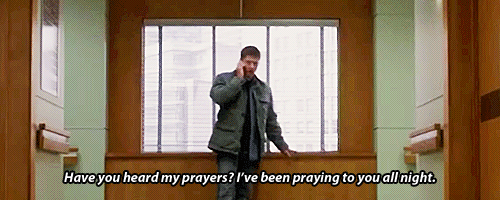
Castiel is human, and while Dean tears apart the grid trying to find him while angels are on Cas’ ass, he still watches him die, then has to kick him from the safety of the bunker the very same day. Up until this point, Cas has been a genuine part of their family regardless of their squabbles over the past months, but kicking him from the bunker damages that. Once the reasoning comes to light, however, Cas is forgiving immediately. He’d forgiven Dean even before that. That’s one thing about Cas that Dean never seems to get over either. Dean can get angry and take things out on him, kick him from the bunker, make stupid decisions and nearly kill himself, holler at him, blame him, but Cas comes back every time. He forgives him every time. It’s already overwhelming when Sam does this, but the ease at which Castiel consistently forgives Dean is a lot.
Dean gets the Mark of Cain. It’s a means to an end, he says. When he becomes a demon as a result, this is when his relationship with Crowley is deepened. This relationship is an interesting one because it’s essentially an unrequited example. Dean likes Crowley, and when he’s a demon he has a good time, but Crowley’s feelings appear to go much deeper- even if he tries not to show it.
It is very possible that Dean and Crowley’s relationship is a formation more as a result of a joke than anything else- where the writers are concerned. But whether that was the intention or not, this is a relationship that continues to affect Crowley’s actions towards Dean for the rest of the series. He doesn’t let Dean kill innocents as he’s a demon, he saves Castiel from certain death as his grace drains, he gives Sam the information to find Dean so he can be cured, and he aids in getting the mark removed from Dean even as Sam attempts to kill him in the process. In return, Dean gives Crowley the benefit of the doubt more often, and they share a sort of mutual respect. What differs here, however, from Dean’s relationships with Benny or Castiel, is Dean’s actions. It is clear that Dean doesn’t feel as deeply as Crowley does, so this is an interesting relationship to compare side by side with the others.
Not only this, but DeanxCrowley in these first few episodes can be seen as a parallel with CasxHannah. Two unreciprocated relationships which do not last long in this particular phase, but do result in a friendship within these pairings as time goes on.
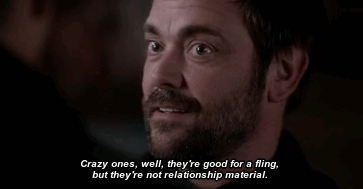
Still with the Mark of Cain, Dean and Cain have a few things in common. Cain had said that his wife, Colette, before she died had asked him to stop. Stop the killing. It’s several months after that that Dean is going off the rails and Cas, behind Dean as he’s walking away, asks Dean to stop. He nearly kills Cas then, almost fulfilling Cain’s words just weeks earlier: “And then you’ll kill the angel, Castiel. And that, I suspect, would hurt something awful.” This is a direct romantic parallel written into the show.
When the darkness is released, Amara and Dean are immediately drawn to one another through some sort of connection as a remnant of the mark. This relationship is another interesting one, because it ties in to true desire and consent. Dean is drawn to her, yes, and she is sold as a sort of potential love interest this season, but Dean himself doesn’t want anything to do with her. He’s hypnotized when he’s around her, but as soon as he’s away this energy dissipates.
So in light of this storyline let’s talk about consent and the sexualization of Dean Winchester for a second, shall we?
Dean is an often highly sexualized individual. He plays along more in his younger days, but the older he gets the more frustrated he becomes with the whole situation. I’m sure there are more but here are some tentative examples (This is also something that happens to Sam a decent amount as well.):
Wendy at the psych ward in “Sam, Interrupted” kisses Dean
Pamela touching Dean’s inner thigh in “Lazarus Rising”
Ezra in “Time After Time” kisses Dean without consent
Gets turned into a vampire because he’s “pretty”
Pamela in “Dark Side of the Moon” kisses Dean
Almost becomes a vessel for Sandy’s mate in “The Thing” because she “enjoys looking at his face”
Amara kisses Dean in “O’ Brother Where Art Thou”
Mildred gropes Dean’s leg in “Into the Mystic” and continually makes advances even tho he’s uncomfortable.
Random girl slaps Dean’s ass in “The Last Call”
Ellie in S8 wants to sleep with Dean and even kisses him randomly
Meg kisses Dean as he’s being held against his will in “Sympathy for the Devil”
Granted, there aren’t a plethora of examples, but it’s still a lot and it is interesting to see how often Dean has been sexualized for someone else’s pleasure. It is bound to work into his characterization as well, and his sense of self-worth. He’s often described as the pretty one of the brothers, and seeing as he is the more promiscuous of the two, it is assumed that he welcomes all of or most of the attention that comes his way.
It is for this reason in particular that the situation with Amara is bothersome to me. Not only is Dean taken advantage of physically, but his mind is essentially hypnotized whenever she is near, not giving him total control over his actions or desires. Amara is in part meant to be sold as a romantic interest, but throughout the season Dean continually expresses his discontent. He’s even ashamed to admit these feelings to Sam and Cas, even though he knows it isn’t his fault he still feels responsible. (Which, if we think about it, this is could be a queer allegory too. The lack of choice, feeling shame, etc.)
What is notable, however, is the day that they attempt to capture Lucifer and speak to Cas to get him to expel Lucifer from his body. Amara makes a surprise appearance and captures Lucifer/Cas herself. Dean yells to Cas. This catches Amara’s attention and appears to confuse her, and even Lucifer, seeing as when Dean is around her he’s meant to have eyes for just her because of their “bond”. His link to Castiel appears to be stronger, however.
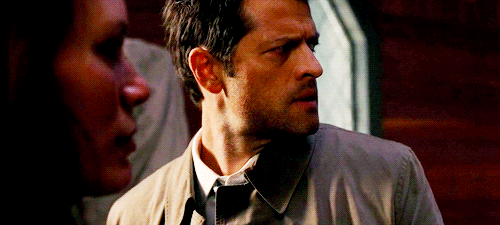
Amara uses this connection between Cas and Dean when she wishes to contact Dean, simply by placing her hand over Castiel’s heart. She says to Dean, “If you should cross paths, if (god) should reach out to you, he should know this - Lucifer, his favorite, isn’t doing so well. Say nothing of the vessel, your friend Castiel.”
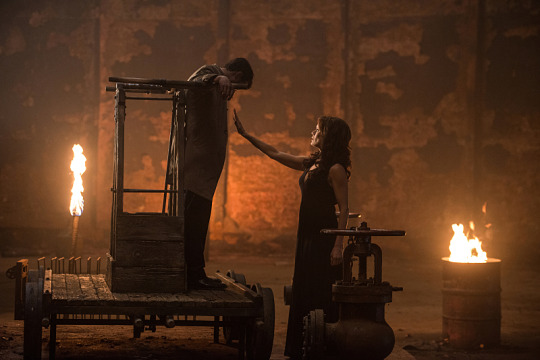
If we backtrack a moment, Dean finding out that Castiel is possessed in the first place is a very emotional time for Dean. He doesn’t want to accept that Cas would make such a decision, put himself in that kind of danger, and choose to leave once again. Sam, the arguably more rational thinker at this current time, tries to rationalize that Cas may not come back willingly since he chose to let Lucifer in. “Not possible.” Dean says. It’s simply not possible that Cas doesn’t want to come back to them. It’s not something he can accept.
The next several episodes are begun with Dean either losing sleep trying to figure out what to do about Cas, or simply moping about. Sam has to comfort him each time. This is notable behavior as well, because Dean isn’t often one to wear his heart on his sleeve this frequently. Certainly he has his moments, but much of the time when he’s distressed he simply buries it all down and puts up a front. He doesn’t do that here. In fact, once they do begin to put together a plan with Crowley, Sam thinks they should still utilize Lucifer in the fight against Amara but thinks it’s foolish to move him into a new vessel.
((I actually counted up the mopey Dean scenes- between finding out Cas is possessed, to getting Cas back.))
There are four convos with Sam (multiple episodes) where Sam has to comfort Dean and say something along the lines of “we’ll get him back.” (Just as an aside, I don’t think there has ever been a scene in the series where Dean comforted Sam about Cas, it’s always Sam having to comfort a freaking out Dean)
Then, of course, there’s the scene where Dean comforts a victim and she says “I watched the man I love die. There’s no normal after that.”
There’s the “It’s not an ‘it,’ Sam. It’s Cas.” scene.
There’s Dean trying to get through to Cas when they capture Lucifer.
There’s the Dean yelling “Cas?” to Casifer when Amara is in the room.
There’s two more scenes where Sam comforts Dean again.
There’s “The Chitters” episode with the gay hunter couple. (This isn’t a direct relation, but more of an honorable mention because it seems abstractly relevant)
Amara connecting to Dean through Cas’ heart.
Dean freaking out about making it to Cas in time and again talking to Sam about it.
Dean asking “what about Cas?” as they’re planning the attack with God against Amara.
Someone has said once that you can tell that Dean is in love with Cas because Sam isn’t. It’s in moments like this that this becomes readily apparent. Yes, Sam cares about Cas, of course. But it’s just different than the way that Dean cares about Cas. When Dean cares about certain people, this love weaves into the very fabric of his being and he just feels it so completely and overwhelmingly, he can’t simply not fight for it.
“Dean, it’s a strong vessel, it’s held Cas for years, and we know what he’s been through.” Sam says.
“It? It’s not an ‘it,’ Sam. It’s Cas.”
Dean appears almost shocked that these words would pass through Sam’s mouth. He’s confused that Sam wouldn’t fight for Cas just as much as Dean would. The type of love they each have for the angel is just different. Visually, action-wise, reaction-wise. This conversation in “Hell’s Angel” highlights that.
You know what else highlights it? The fact that when they do trap Lucifer, it’s only Dean who gets through to Cas and talks to him to get him to come back and expel Lucifer. It’s Cas only seeking Dean’s forgiveness in S7 when putting the souls back in Purgatory. It’s Dean in S6 being the only one to defend Cas in “The Man Who Would Be King.” It’s Dean later in that same episode being the one to get through to Cas in the circle of holy fire. It’s “I did it, all of it, for you.” It’s Dean carrying around that trenchcoat for a year and mourning when Sam doesn’t. It’s Bobby checking in on Dean mourning Cas, but doesn’t check in with Sam about it. It’s Sam pulling Dean out of the apocalypse world in season 12 as Dean screams for Cas and physically fights against Sam to get to Cas. It’s Sam seeing Cas dead on the ground minutes later, but still able to walk away while Dean is frozen in place, frozen in shock. It’s Dean being the only one to wrap up Cas’ dead body. It’s Sam always having to reassure Dean that Cas is probably fine, whenever he goes missing for a little while. It’s Dean hardly able to function in S13 with this encompassing grief over Cas’ death and yelling “It got him dead! Now you might be able to forget about that, but I can’t.” It’s S15 when Rowena tells Dean and Cas to fix their quarrel before it’s too late, and later Dean in purgatory not sure of it is too late as he’s praying for Cas to be okay and crying against a tree.
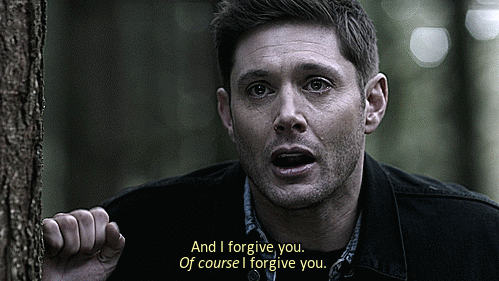
Sam’s reactions are important to take into account. Sam cares, yes, but Cas isn’t as wholly encompassing in his life as he is in Dean’s. If anything else is to prove that, it’s the way that Dean grieves (I mean, if you were to put Sam in Dean’s place in 15x09 in Purgatory and their fight, there’s no way that Sam would react this extremely).
There are three different points to highlight Dean’s grief. The first is season 7 with the trenchcoat, which we’ve already talked about. The second is when Cas is possessed by Lucifer, which we have covered as well. The most damning, however, is Dean’s season 13 grief arc following Cas’ death. Dean also loses his mother during this time and a few other friends, but considering how he reacts when Cas comes back, a great amount of this grief has to do with Cas. Dean completely loses hope and faith in anything at all during this time. He hates Jack for giving Cas false hope and getting him killed. He doesn’t believe in their mission anymore. He doesn’t believe anything matters at all. “Right now, I don’t believe in a damn thing.” Dean admits to Sam. When Cas comes back from the dead, however, he pulls a complete 180. He has hope again. He has faith. And all of it begins with Cas.
Lastly, Dean never hooks up with anyone again after Castiel’s final resurrection. We can go through an outline of the steady decline of Dean’s hookups and relations outside of Cas as the decade goes, but during this three year window specifically, Dean’s only pairing is Cas. Sure, he might flirt with someone every now and again, but this never goes anywhere. (Arguably the person he flirts with the most in any episode in these final three seasons is Daphne, but idk if that even counts much considering she is a cartoon.) And as Pamela says once in Rocky’s bar: “Besides, you don’t want me. You just like to flirt. I’m psychic so I kinda know.” And that was just in Dean’s head anyways so it’s probably even more true than had Pamela actually said it herself.
When Jack comes in the picture in season 13, and Castiel comes back from the dead, this makeshift little family is formed. All three men act as father figures to this half-angel kid at different capacities, and amongst this dynamic another is formed a bit further between Dean and Cas. They’ve already been acting a bit as an old married couple in recent years (Lily Sunder Has Some Regrets, anyone?) but this co-parenting scenario they’ve found themselves in has solidified this dynamic all the more as they collaborate on the issues that arise with Jack. In “Lebanon” when John Winchester comes back for a brief period, John even says to Dean that he’d hoped he would get a family someday and get out of hunting and such. Dean replies, “I have a family.” Sam, Cas, and Jack are his family. Cas has been family for a long time, but here and now Dean just isn’t looking for anything else or anything normal. He’s happy with himself and the people he’s surrounded by. He’s not looking for anything else or anyone else.
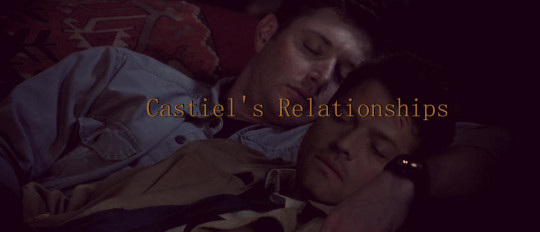
For a change of perspective, let’s check out Castiel’s relationships over the years.
Unlike Dean, Castiel’s queerness and interest in Dean has been officially canonized. We can speculate all we want on the legitimacy of Dean’s love for Cas, but we can speak in certainties about Castiel. Castiel is in love with Dean Winchester. Speculation can come in when we consider, just how long has this love existed for him? Let’s start from the beginning.
Right off the bat when we meet Castiel, he’s a semi-emotionless soldier of heaven who works under strict orders and doesn’t have much free-will. Dean begins to change this. We can see even in their first couple encounters that Castiel is interested in Dean- in what he has to say, intrigue in the fact that Dean talks back to the angels (despite that these angels are unkillable beings and could smite him on the spot), the fact that he’s snarky and brave and questions everything. Where Uriel finds Dean annoying and blasphemous, Castiel finds the back-talk fascinating. Dean’s words impact Cas, and it’s not long before he starts to have doubts about Heaven. Following these orders blindly and unquestioningly starts to seem foolish when Dean puts things in a different perspective.
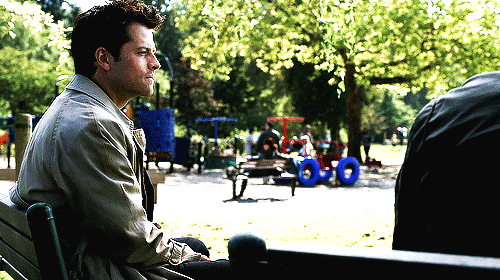
Even after Cas undergoes what some have funnily dubbed “conversion therapy” in “The Rapture” (when Cas had finally decided on going against Heaven and to help Dean stop the apocalypse) it’s still not enough to stop him completely. A bit more time with Dean and he’s convinced yet again to help this one human man stop the apocalypse with his brother. He even dies for him and this new mission of his.
Castiel throughout this first season is interesting because we see firsthand his struggle to understand beginning to feel emotions and accept thinking for himself. “For the first time, I feel...” He says to Anna. He wants her to tell him what to do. He wants orders because that’s all he knows, and he doesn’t understand why suddenly he cares. It hurts him to send Dean in to torture Alastair. It hurts him even later when in the beautiful room Dean dismisses him with a “What do you care, you’re already dead. We’re done.”
It’s possible that in these first several months, or even these first couple seasons, that Castiel follows Dean around and does as he asks because he’s allotted Dean as the new being he serves. Because serving is what he knows. But it’s also through this that he begins caring more and more. He learns more how to express certain emotions, he learns more about humanity, he learns more about what is important in life and what is worth fighting for. As Cas will admit himself 12 years later, “Ever since we met, ever since I pulled you out of Hell... Knowing you has changed me. Because you cared, I cared. I cared about you. I cared about Sam. I cared about Jack... I cared about the whole world because of you.”
We start to see sprinkles of this especially throughout season 5 as Cas begins to come to terms with caring and adopting Dean’s mindset to care. Consider Sam for a moment. He and Cas don’t necessarily get along a lot and mostly just tolerate one another in these early days. However, as we see in “Abandon All Hope” when Castiel is captured by Lucifer, Cas gets visually upset at the concept of Lucifer taking Sam as his vessel. “You are not taking Sam Winchester. I won’t let you.”
Sam and Cas don’t have much of a relationship at this point, but Cas cares because Dean does. In “The Song Remains the Same” not long later, he even refers to Sam as his friend.
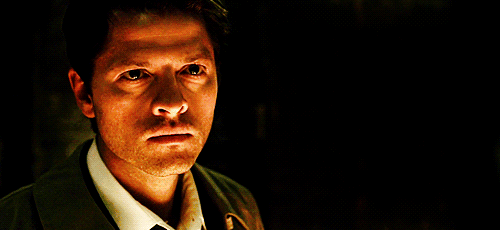
By the time S6 rolls around Castiel is in the midst of a civil war in heaven entirely because he has adopted the Winchester’s all encompassing mindset on the importance of free-will. Castiel is making his own choices, and he does everything he can to protect the Winchesters from harm as he does so. He decides not to seek out Dean’s help while he’s raking leaves because Dean had already sacrificed too much in Castiel’s eyes. He raises Sam from perdition because he feels it the right thing to do. He re-sinks the Titanic to keep the boys from being killed by Fate.
Personally, I think Castiel has been slowly falling in love with Dean this entire time, he’s just not aware what this feeling is. But this becomes even more plausible to me when we get Castiel’s perspective in “The Man Who Would Be King.” Cas cares what Bobby and Sam think of him, sure, but all he focuses on is Dean. Dean’s happiness and ensuring he not sacrifice more. Dean’s loyalty even as Cas seems to be guilty. Dean’s words when they capture Cas in holy fire.
The problem is, their relationship this season is also rocky. Cas seems to think that he’s merely a tool at the Winchester’s disposal and not much else. But he doesn’t mind because he cares about them so much, so what do his feelings matter? He sees himself as their protector. Their guardian angel. A role he’s fine with filling regardless of how they feel in return.
But when things get bad, Dean says to him “Next to Sam, you and Bobby are the closest things I have to family. You are like a brother to me. So if I’m asking you not to do something... You’ve gotta trust me, man.” and Cas seems genuinely surprised at this admission. Emotional, even.
As time goes on, Castiel’s actions nearly primarily revolve around Dean
After Cas realizes his error and is sending the purgatory souls back to their place, he tells Dean repeatedly that he’ll find some way to redeem himself to him. That’s the most important thing to him then.
When Cas smites the demons outside of the mental hospital in 7x17, all of his flashes of memories coming back were memories of Dean.
Partially to aid Sam and partially to redeem himself to Dean, Cas takes on Sam’s Hell brain in the asylum and goes crazy.
Cas runs in purgatory to keep the leviathans away from Dean.
Cas breaks out of Naomi’s mind control/brainwashing because of his feelings for Dean.
Let’s talk about that final bullet point for a moment. The Naomi chapter is damning in “Goodbye Stranger.” It isn’t copies of both Sam and Dean that Naomi trains Castiel to kill hundreds upon hundreds of times. No, it’s ONLY clones of Dean.
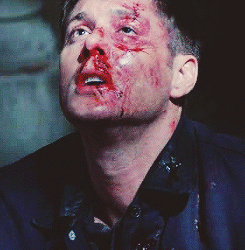
“What broke the connection?” Dean will ask after Castiel heals him in the crypt and takes control back over his mind. “I don’t know.” Cas will say. It wasn’t the angel tablet. That may have unwound the last of Naomi’s control over him, yes, but he’d dropped that angel blade before that. It was Dean that broke that connection. Even if this remains unsaid, it doesn’t make it any less true. Maybe Castiel starts to have an understanding of what his feelings are and what they mean here, but he won’t be truly sure until he soon becomes human.
Before we get there, though, we’ll take a brief pause to explore Cas’ heterosexual explorations and connections.
First is Meg. Cas’ relationship with Meg is born of sexual exploration more than anything else at its conception. He’d just been watching porn in his downtime and when Meg kisses him, he goes with it enthusiastically. Later, he seems to have a certain infatuation with her in his “crazy” state, and seems to trust her perhaps simply because she had been watching over him in the institution.
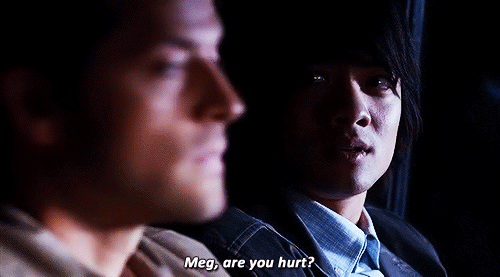
This is interesting because in his “crazy” state, Cas is a lot more raw and unfiltered and optimistic than he ever has been before. He compliments her, is concerned with her safety, and trusts her. On the contrary, with Dean, Cas is a lot more hesitant and even fearful when talking about certain subjects with him because of his past failings. He tries to keep the peace without directly getting involved because his direct involvement in the past had failed them all so spectacularly.
He and Meg continue to have a sort of connection whenever they cross paths until her demise the next season, and he still holds a respect for her years later, continuing to use her nickname for him “Clarence” as an alias at various times.
When Castiel becomes human in S9, he’s a bit lost and overwhelmed. April takes him in for the night. Although this is a short-lived romance considering she tortures and kills him the next day, for a brief enough time Cas starts to become acquainted with human romance and sexual desire. He loses his virginity to her. It is estimated by some that this is merely sexual experimentation on the part of a very confused newly human Cas, and others have used this to say that Cas is not gay but pan or bi. The conclusion in any regard, in my opinion, is purely up to the viewer.
If I’m to offer my opinion, however, seeing as he has shown interest in both sexes, though remains unlabeled, I consider him simply an unlabeled queer person. Sexual identity and orientation has never seemed to matter much to Castiel, so I don’t see why it should matter to me. He loves who he loves, simple as that.
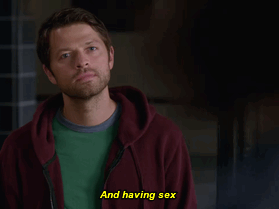
When we get to Hannah, she provides an interesting foil to Castiel for a time, and an emphasizing expression on just how much he’s changed since his introduction to Earth and the Winchesters. Where Castiel has been open to a plethora of new emotions and experiences through the years which have made him a bit more human than angel at times, Hannah is still new to humanity and the range and movement of emotions that come with it. Just how little she seems to understand proves how much Castiel has grown and does understand by comparison.
As such, he seems to pick up on the fact that Hannah has an attachment to him that appears to be forming into a romantic or sexual interest. He gently turns her down multiple times, not expressing interest in her behavior although he does respect her greatly as a person. Though this relationship isn’t considered romantic from Castiel’s perspective, its unrequited nature again is a good parallel to Dean and Crowley’s relationship at this same time. Angel x Angel and Demon x Demon. Both one sided.
Now, let’s get back to Dean.
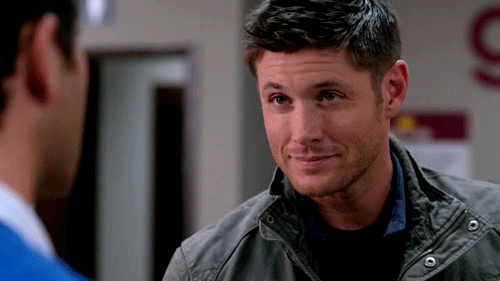
Up to the point that Castiel turns human, for however brief a time, he finally gets a look behind the curtain of human emotion. Now, we all know that Cas is in love with Dean already here- and probably has been for some time. Years, even- but it’s my personal belief that during this time turning human is when he actually realizes it and understands where these emotions come from.
Maybe it’s the heartbreak of Dean kicking him from the bunker, maybe it’s seeing Dean again when he shows up in line at the Gas n Sip, or maybe it’s somewhere in between when he sees two people on the street looking at each other and realizes “oh, that’s love. I know what that is. I felt that, too.” And every moment from then on he realizes what that feeling was in his chest when he looked at Dean for a little too long, or why it hurt so much to see the pain in Dean’s eyes at something Cas had done, or why hearing Dean’s prayers to him just felt different than they did with Sam’s. Why everything that he’d done since he rebelled from heaven was in the name of doing the right thing, muddled alongside doing the right thing for Dean. Caring because of Dean. Caring for Dean.
It’s during this time when he realizes what these feelings are, that he also must come to terms with the fact that they’re unreciprocated (or as he believes, anyway). This is for two reasons. The first, he still believes at this time that Dean kicked him from the bunker just because. And the second, if there’s anything that Cas took to heart from Dean’s example as strongly as the concept of free-will, it’s self-loathing. He doesn’t see himself worthy of love. Dean doesn’t see himself worthy of love either. They’re both messy piles of self-loathing that breeds into a blindness to the depth of care they hold for one another.
Now that we’re on the topic of self-loathing, this leads into Castiel and his decision to become Lucifer’s vessel in season 11. Much like Dean, Cas has a consistent issue with seeing his own personal self-worth, so when the opportunity comes along to “be of service to the fight” and become Lucifer’s vessel, he takes it on easily. He considers himself expendable, and he won’t see just how much Dean struggles with this fact while he’s possessed. In fact, Cas never knows just how much Dean struggles with his absence at all, which is just one of the many divides between the two of them that could easily be resolved with communication, if either were ever good at that.
Once Lucifer is shoved from Cas’ body, however, Dean makes a point to let Cas know just how important he is in his life. He’s said Cas was family before, but that was before the falling out at the end of season 6. Dean makes it clear that he and Sam both consider Cas family, once again, during a ride in Baby. “You’re our brother, Cas. I want you to know that.”
Now, here, simultaneous heartbreak and love occur. Because while Cas is likely very much in love with Dean here, and very much aware of it, to hear that Dean simply thinks of him as a brother must ache a bit. However, we’re also talking about Dean Winchester, and for him to call someone a brother is an immense depth of love, probably the most the man is even capable of. Dean never says the words “I love you” to anyone, so this is about the closest anyone could get. Cas knows this, he’s well-versed in the ways of Dean Winchester by now. So, while it aches, his heart is also full.
Comparable to:
“We need you, Cas. I need you.” 8x17
“We’re gonna shove your ass back through the eye of that needle if it kills all three of us.” 8x05
“Don’t make me lose you, too.” 7x23
“Don’t do anything stupid”
The entire purgatory confession/apology prayer in 15x09
Cas returns this love just hours later, offering to go with Dean to die taking out Amara.
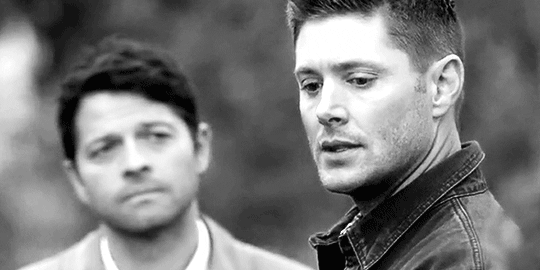
If we jump forward to the divorce arc of season 14-15, we can hit upon the next great heartbreak of Castiel’s sad little love life. While the Winchester brothers, Castiel, and Jack have all become a family unit, Castiel never wants to lose that. But two things happen. First, Cas’ deal with The Empty is made, and somewhere along the line, silently, he becomes aware that allowing himself to be happy, and that happiness, somehow involves Dean. The second thing that happens is Jack kills Mary Winchester, and Dean says Castiel is dead to him.
So, The Empty won’t take him, but his family is broken apart. Castiel never gives up on a single family member, though. That’s the thing about Cas. The same way he consistently forgives Dean for all his behaviors over the years, he never loses faith in anyone in this family. And when they come to reunite, he’s happy simply in appreciating any and all time they have together, however brief.
Then, in true Castiel fashion, he sacrifices himself for Dean Winchester in 15x18.
Their relationship has always left things unsaid, but I don’t think there’s ever been a question on whether Dean loves Cas or Cas loves Dean even if they don’t talk about it. You can’t look at Cas and Dean’s faces seeing each other again for the first time in weeks at the end of “The Last Call” and say that there wasn’t love and heartbreak there. On some level I think that Cas knew that Dean loved him back, but Dean was so buried in trauma at that point that it might take him years more to realize what he actually felt and what he needed. But Cas is such a selfless lover that he was absolutely 100% fine with just being around Dean for the rest of his life, even if he never got a chance to tell him how much he genuinely cared for him, and never got that reciprocation back. Castiel’s love for Dean is so pure and selfless it’s overwhelming to even consider, but for someone like Dean it would be a hundred times harder to accept or even fathom someone caring about him as much as Cas does.
So Castiel never pushes Dean further, never suggests, barely even touches him. The only liberties Cas takes are small touches to heal him (even though he doesn’t need to touch a person to heal them), a few small hugs through the years, just sharing comfortable space inside the impala, small moments watching Dean’s favorite movies with him, or sharing a moment over beers in the kitchen. And Cas’ happiness was in telling Dean how much he loved him likely because then maybe Dean would actually see how much he was worth. Cas wanted Dean to know how much he loved him and how he viewed him, because Dean deserved to love himself and was worthy of it.
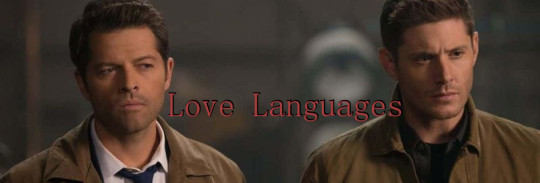
The five types of love languages are as follows:
Words of affirmation
Physical touch
Gift giving
Acts of Service
Quality Time
One of the reasons Dean and Cas miss the mark with one another so often could simply come down to love languages. A lot of the time, what a person needs in love language is often what they also give. I don’t think this is the case where these two are concerned, though. They’re both so sacrificial that it’s difficult for them to accept this in return, even though this is what they each offer to the other and anyone else around them.
Both Cas and Dean’s giving love language is “acts of service” which translates into sacrificial actions much of the time, though it can also be more domestic than that as well. It’s Dean grabbing an extra beer for Cas or making food, or it’s Cas healing Dean without any prompting, Cas loading up on pie and beer at the Gas n Sip when Dean’s mad at him.
What they each need, however, is different. Dean needs “quality time.” He needs his people close, he needs them to answer calls, and he needs to know where they are. This clearly ties in to his abandonment issues, and it hurts his relationship with Cas significantly when the angel just keeps leaving, or disappears without answering his phone for days at a time. And when he dies, obviously. He always comes back, though. And half the time when he’s gone it’s because he’s trying to get a win for Dean against whatever issue the team is facing at the time.
What Cas needs, best I can tell, is “words of affirmation.” Cas has a consistent problem with thinking that he’s worth less than he is, and is less important to the people around him than he is. Dean obviously has this issue, too, but with Cas it’s somehow infinitely worse, if that’s even possible. Frequently, what he needs to get him going in low points is a few words from Dean or encouragement in general. To name a few:
“Maybe to fix it.” 7x17
“I’d rather have you, cursed or not.” 7x23, Cas then goes with Dean to find and kill Dick Roman
“I’m not leaving here without you.” S8 in purgatory when Cas wanted Dean to leave him behind but Dean was having none of it.
“You’re our brother, Cas.” 11x23, after Cas was possessed by Lucifer and thought he was expendable.
Over time, Dean does get a bit more vocal with Cas about issues he’s having or just with encouraging words as well. Cas, too, sticks around a lot more. They’re not perfect but they do begin to grow and work with one another in these later years to give one another what they need most to see how much the other is loved.
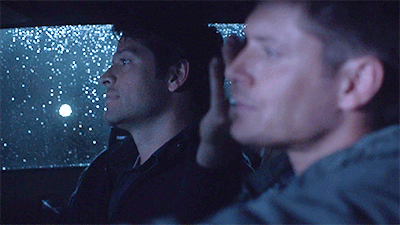
In conclusion, there is a significant amount of romance and sexuality written into this show, and simply interpreted as well. And that’s the thing, when a queer person says that they interpreted a certain piece of media as queer, it’s not up to someone else to say that they can’t, or shouldn’t, or that they’re interpreting something wrong. That’s the thing about media, it can have so many different interpretations and meanings to so many different people.
It’s my personal interpretation to see the queerness embedded in the text here. Maybe it’s not there for another person, and that’s cool too, just don’t tell me how I should see it. The fact is that it was written into the show to be interpreted, and interpret is what we did.
I’d love to hear any feedback that others may have regarding this. Any other theories, different interpretations, things I may have missed. I hope you enjoy the edits, and the endings I put together for them. We all need a little bit of happiness after that ending, so I hope it leaves you with a lighter heart. :)
Much love,
Taylor
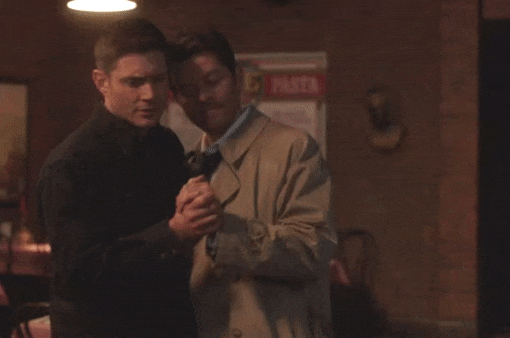
#Destiel#deancas#deanwinchester#Castiel#gay angel#bisexuality#gay#lgbtq#supernatural#spn#Destiel mastercut#bi dean#bidean#bidean mastercut#bisexual dean Winchester#gay Castiel#pansexual Castiel#sexuality in supernatural#romance in supernatural#I swear I’m not crazy with these lengthy edits#working on this project is helping me keep busy while tending to my sobriety#took a darn long time but it was therapeutic to edit#it’s true this project is partially born of spite tho#I thought of it after samanthas tweets the day after the wedding and started downloading the episodes that same day#benny lafitte#lisa braeden#spn tiktok#summerania#can you tell that season 11 is my favorite season#destiel wedding
86 notes
·
View notes
Text
Perhaps this is a Hot Take™, but as a queer person old enough to have very little formative concept of Representation In Mass Media, especially beyond queer-coded villains and the occasional Butt of The Joke (looking at you, the 90s & early 2000s), I cannot begin to see how people who are part of the LGBT+ community don’t see how deeply in love Crowley & Aziraphale are.
This is only compounded, I think, by my being an adult well past the Terrible Uncertainty of Puberty and Adolescent Feelings. That’s not to diminish the impact and potential depth of falling for someone as a kid/teen/young adult of the near-18, pre-drinking-in-America-legally persuasion; rather, that is merely to say that all this talk of “but they didn’t kiss or outright say I Love You, therefore It’s Not Canon” feels like it completely oversimplifies and wraps in far too tiny a box the matter of love, especially between queer folk. It simply overlooks how much of love is so much more than that easily wrapped box.
I’m not just saying that as your local queer fan-of-many-things, used to taking scraps in this department. This is coming from someone who’s spent a great deal of time looking at romance as a whole, heteronormative and queer alike, and yes, someone who can distinguish between a Bad/Insubstantial-But-Fun-Like-Popcorn Romance and a Bad-No-Really-Just-Bad-And-Ill-Conceived Romance, and a Life-Changing-Stars-Have-Moved Romance.
What seems to be flying over the head of so many people who are upset or calling ‘queerbait’ on Good Omens is that many deep romances of the past - of all gender combos - deal in ‘I Love You’s’ that are said, portrayed, made painfully, beautifully clear without the words being uttered at all.
It comes in all forms... Physicality. Expressions. Eye contact - or the lack there of. The way words are spoken - I love you’s, in phrases and situations where I love you’s just wouldn’t fit.
Where sometimes, I love you couldn’t be said. Because of our roles, because of our jobs, because of our families.
So ways were found to say I love you, without uttering those beautiful, dangerous words.
Queer people have seen themselves in the outcasts for generations - for, I’d argue, much of history itself. Wherever we are not wanted, we band together; we see those that are also not wanted and we say “we see you, and you are not alone; we are here too. We may be different, but our stories sing the same themes.”
People far more eloquent than I have explained why queer people identify so frequently with those that love and embrace the supernatural, the fae, the otherwise estranged, the seemingly unknown, the misunderstood. We have grown to read between the lines - to see the love where even sometimes the straight creators deny it vehemently;
But, we argue, Why do you think we resonate with it? Why do you think we see love between these characters, these characters that are growing and changing because of, for, alongside one another - we see them change and learn and hope and trust again because of this one person, we see the looks they exchange, the way their hands brush by or grasp at one another, the way their emotions culminate upon loss, upon regaining.
They are the world to one another, we know, we share. We gesture to generations worth of characters, joy and sorrow and anger and hope in our faces. And you say they don’t love one another, because they share the same gender?
... forever Death of the Author, it is often preached-
-with an asterisk for us, we know too well.
But then there is the Good Omens TV adaptation, and here - here, I, a queer woman who grew up knowing the danger of holding another girl just a little too dearly, who knows the risks of saying I love you where almost every wall has ears, who knows the way you can only hope the clasp of a hand under a blanket, the held gaze across a crowded table holds a thousand thoughts, the quiet peace slipping out the window to sit in the back of a truck and stare at the stars, not daring to hope all wishes could come true-
- here I see two characters, two beings of the same ineffable gender, spending over 6000 years falling in love despite what they are told, despite what they are expected to do, despite what they are expected to value.
I see them say I love you. Again, and again, and again. Over the span of centuries.
So many I love you’s, given in ways I’ve learned fluency in as well as English.
I love you, in a glance - the unexpected crush.
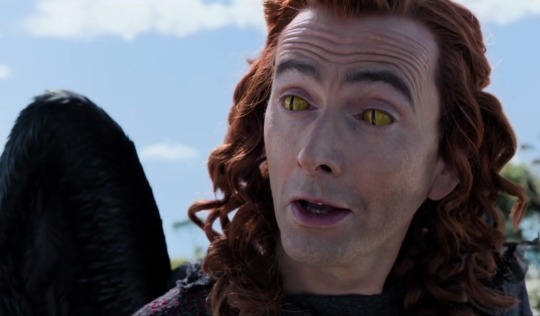
I love you, in catching a slip of the tongue // in slipping up, if it’s with you.
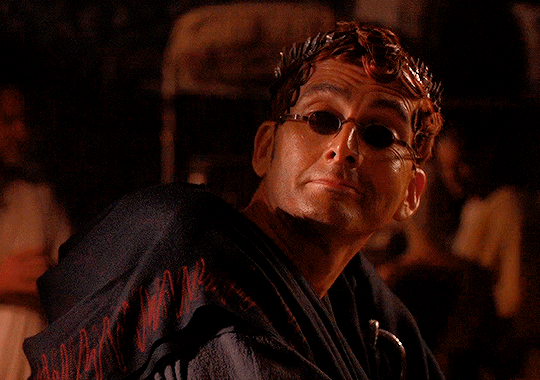
I love you, in relief at you showing up after all // in showing up, even to the gloomy ones.
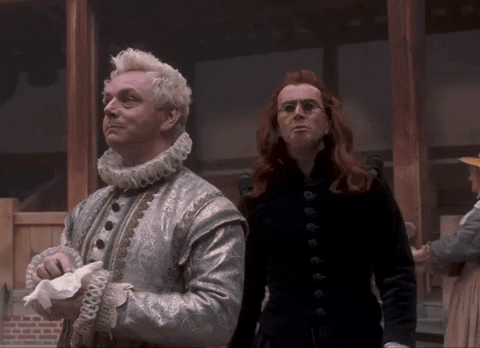
I love you, in knowing what you being caught together would mean // in knowing... what you being caught together would mean.
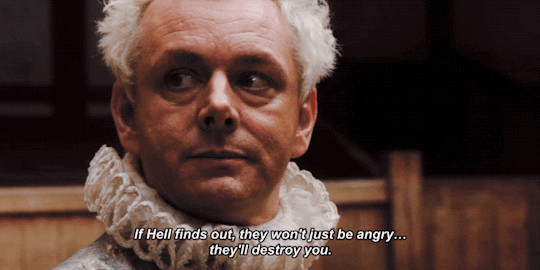
I love you, in your arrival only ever being good news to me // in always showing up when you’re in a bind.
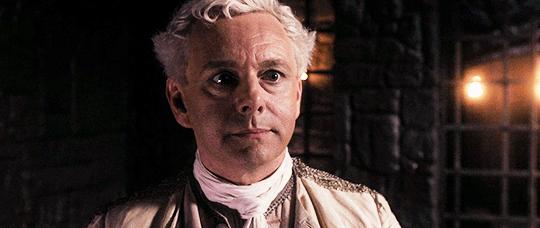
I love you, in refusing you at last on an outright request // in requesting the impossible.

I love you, in truly realizing at last.

I love you, in going too fast // in walking the desperate precipice.

I love you, in the little things // in anything, for you.
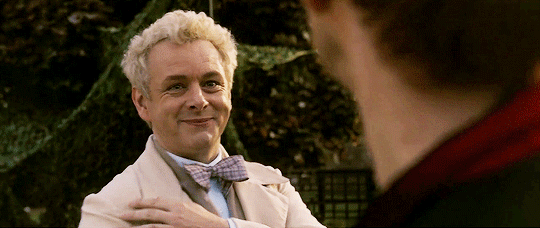
I love you, in feeling temptingly safe // in empty posturing to maintain a shakey line.
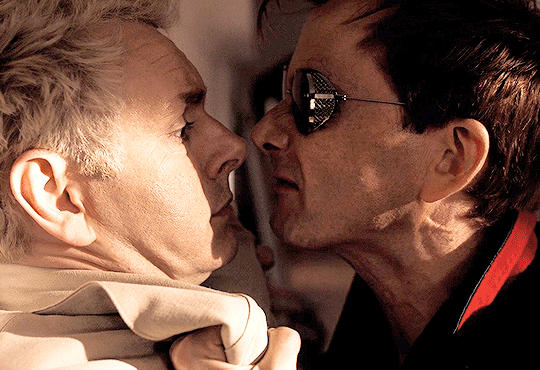
I love you, in losing you.

I love you, in I can still reach you, and I will no matter what.

I love you, in being in it till the end - together.

I love you, in peace amongst one another - in being our own side.
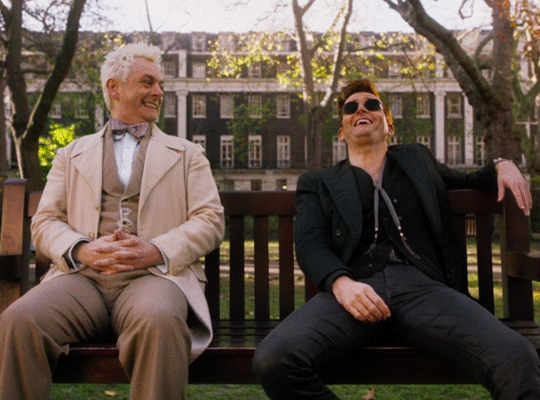
I love you, in I found you.
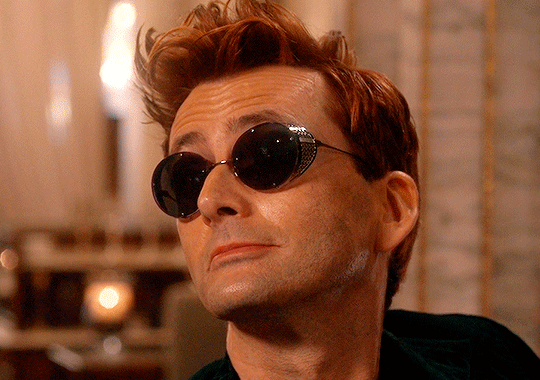
I love you, in accepting myself, too.

...
For the love of the stars, of all that is good and ineffable, please, please don’t make the mistake of confusing a lack of an Ultimate Kiss or the words themselves for being the same as a show vehemently denying the romance, the partnership between two people drawn together over the course of millennia.
I love you is written in every scene of theirs - the highs, the lows, the lost, the gain, the utter joys and everything in between.
I love you, between two beings that have inadvertently become the godfathers of humanity, not just the not-antichrist.
I love you, between two beings knowing they’ve got eternity... barring interference of the holy or hellish varieties. And so far, they’ve managed just fine on staving off that interference... together.
This is a love story between queer people in ways that no other queer romance portrayed at significant scale has managed to quite touch - including how “I love you” is most often spoken in actions, in looks, in everything between the lines... and behind the lines themselves, if you know how to listen.
Please, take a step back, and listen again; watch again. See, this time, the I love you in their every action - purposefully, not in accidental homoeroticism to be later denied. The love that grows against all odds, against all pressure, against all other consideration.
I promise, you won’t be disappointed, if you just learn to see romance and love through a broader lens.
#good omens#good omens meta#ineffable husbands#long post#i love you#comes in so many more forms than just the words#and frankly#good omens is the best romance i've seen in the longest time#and i mean that
2K notes
·
View notes
Note
Wait what was the mess with Ilia/queer representation? I don't usually look into these things so I probably didn't hear or see people talking about it
Happy to explain! First, the obligatory disclaimer: Ilia is a complicated case and, like anything else in RWBY, her place in the show is very much up to interpretation. I think her character arc, particularly in relation to her status as a queer character, is an absolute mess but I know others are of the opposite opinion. Many of the “flaws” I point out are perceived as her greatest strengths. So it’s subjective.
That being said, I wrote a little bit about this during Volume 5 when it was all going down. A simplified list of the primary issues includes:
Introducing your first, long-awaited queer character as a villain (even a sympathetic one)
“Redeeming” her in the span of one episode in a way that provides no punishment/responsibility/growth in the face of the horrific acts she committed
This character is left behind by the story at the end of the volume, presumably never to be seen again outside of, perhaps, a final battle that includes the whole cast
Tying her queerness directly to her villainy
It’s this last point that I take the most issue with. See, the fandom is right to point out that Ilia has motivations for her actions established throughout the volume, namely the death of her parents and the general racism that is still pervading Remnant. Ilia says multiple times throughout Volume 5 that this is why she’s going after Blake and her family. Because she honestly believes that they are a threat to the faunus’ progress. However, just because a character says something doesn’t make it true. Take Yang in the same season. She says she doesn’t want/care if Blake ever comes back to the group, which anyone with even a cursory knowledge of the show knows is BS. Rather, Yang’s emotions are functioning on multiple levels. A part of her really doesn’t want Blake to return because she’s still furious with her, whereas a larger part of her wants them to reconcile. Now, apply that logic to Ilia. It’s absolutely true to say that she’s motivated by activism and the death of her parents, however, her confrontation with Blake reveals that this isn’t the only reason for her attack. It is, arguably, not even the primary reason. Ilia gives a speech about how they need to be doing more for the faunus, how she doesn’t like to hurt people but she can’t deny that it has gotten them results. Yet when Blake challenges this part of her identity - you’re not a killer - the conversation unexpectedly takes a turn. When pushed to explain how she became this way Ilia does not reiterate her thoughts on racism or the trauma of her parents’ deaths. Instead, she starts talking about her unrequited feelings for Blake:

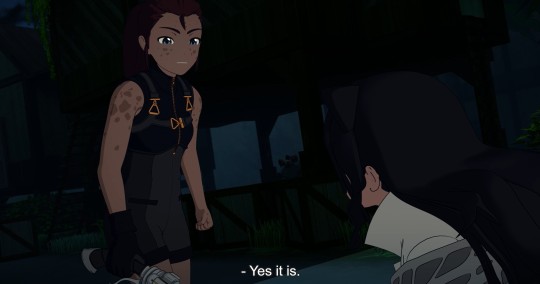
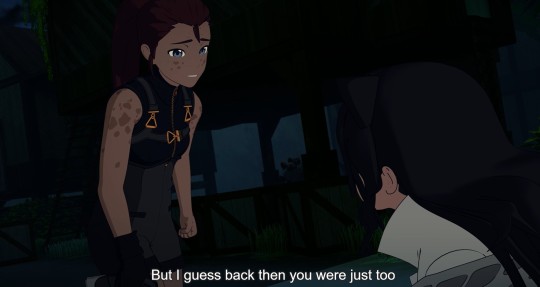


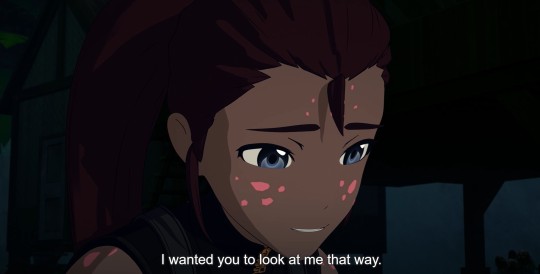
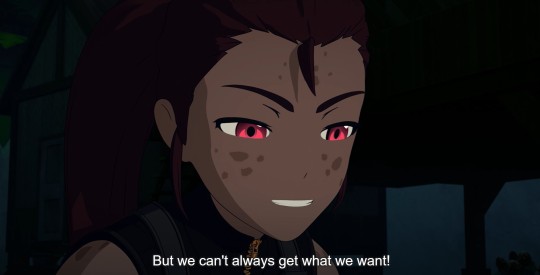
Suddenly, Ilia’s motivations have changed. Or rather, they’ve become more complicated. Both sets of motivations exists, but this is the one she admits to under duress, framing it as more “true” than what she’s been saying prior to this conversation. Now, Ilia shows personal motivations rather than just the generically good rhetoric of I Want To End Racism Because It’s Bad. Having Blake down on her knees, shipping her off to Adam, and killing her parents is explicitly connected to the (perceived) problem of, “You didn’t love me.” Blake is positioned as responsible for who Ilia became: You want to know why I’m like this? You were too busy looking at Adam. I wanted you to look at me that way but you didn’t. That’s how I learned that we can’t always get what we want. So now you don’t get to have what you want (your parents’ safety, distance from Adam). You get to feel what I felt when you didn’t love me back. When Blake poses the question of, “Why are you like this?” Ilia’s answer is “Because I’m queer, have unrequited feelings, and that taught me that life sucks. Now I’m returning the favor.”
Suddenly, Ilia’s actions are removed from the (already ethically dubious) logic of treating Blake this way because she believes it will help the faunus in the long run and instead are implied to stem from a desire to punish her for not reciprocating those feelings. In this moment Ilia moves from a misguided activist-turned-terrorist and instead becomes a misguided lesbian seeking revenge. She might not admit it - she never explicitly says that she’s punishing Blake for not loving her - but that’s the implication by taking the conversation in this direction; by having Ilia answer with her sexuality rather than her activist views. By drawing such an overt connection between these actions and Ilia’s admission, these things - the impending death of Blake’s parents, kidnapping her, sending her back to her abuser - are framed as things that she “deserves” according to Ilia. If you’d just looked at me with love from the start we never would have ended up here. This falls into a number of horrible tropes including, but not limited to, The Predatory Gay, The Psycho Lesbian, and The Queer Character Falling For Their (Presumably) Straight Friend.
Now, the takeaway here is not “You can never write villainous queer characters.” More often than not any statement beginning with “You can never write ____” is going to be a bad take. Indeed, there are tons of queer/queer coded villains who I adore. That doesn’t mean I want media to perpetuate that long, stereotyped history though. “But Clyde,” the world says. “That doesn’t make any sense. How can you both want and not want this setup?” To which I respond with the iconic words of Jane Lynch:

People’s identities are made up of multiple parts and those parts can read the same writing choice in different ways. As a queer person who loves the ~drama~ of a flamboyant villain I want that entertainment (like Watts). As a queer person who is disgusted by the implications tied to that trend (you’re evil, you’re unnatural, you’re sick, you deserve to be punished, to be killed) I don’t want to see our only queer character be a villain. Which is what Ilia was at the time of her reveal. She was all we had and we didn’t know if RT would ever going to give us anyone else. That was just awful to watch and worry about. It didn’t make me happy. Which sounds like a shit thing to say - This isn’t your story! It doesn’t cater to you! - but after years of waiting for queer rep it felt like a kick in the teeth to get this character in this way and leave her behind when we had a cast of five main women right there, any of which could have been queer. Ilia’s reading was made worse by the lack of rep surrounding her, but to be frank things haven’t improved much. I adore Saphron and Terra, I think they were really well done as characters, but they’re still very minor characters and we can’t ignore that, like Ilia, they were left behind by the story. Blake and Yang are not canon yet, leaving all the hints at their relationship sitting in the limbo of, “Is this just queer baiting?” If you’re someone who pays attention to queer coding, a lot of queer-coded men have been killed off in this show (Roman, Ozpin, Clover). We supposedly have one trans character… whose identity thus far only exists in a tweet.
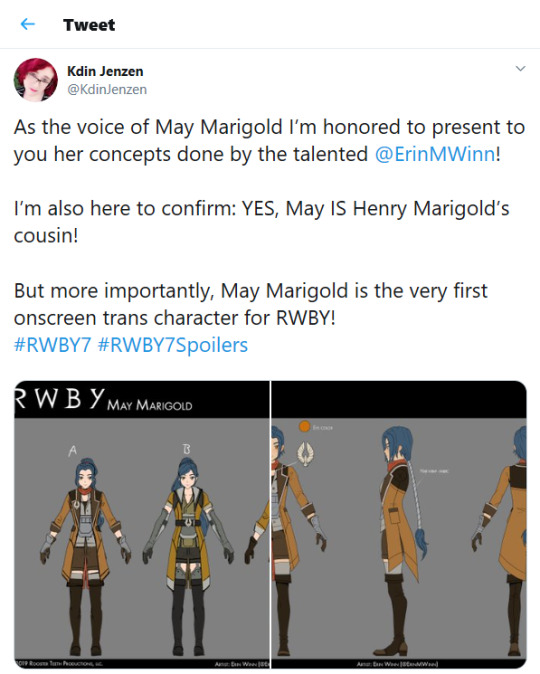
Kudos to RT for hiring a trans voice actor - they absolutely deserve recognition for that - but it’s still not enough in this day and age. It’s 2020. Queer coding, queer minor characters quickly shuffled off screen, and queer “rep” in the form of paratextual info simply doesn’t fly. We decided that in the most vocal terms possible during the Harry Potter era, a fandom that took over most of the world and, thus, had one hell of an impact on media going forward. No, it’s not rep if you say Dumbledore is gay in an interview but never work that into the story. It’s not rep if you say May is trans on Twitter but don’t work that into the story. Not unless both characters are supplemental additions to a canon already filled with a variety of queer rep. “It’s so cool that this character is also queer! I get why you didn’t have time to work that in, so it’s a good thing we have those five other characters to identify with.” RT might do that in the future. Blake and Yang might become canon in Volume 8. May might be confirmed in the show. Saphron and Terra might unexpectedly arrive to become a part of the story again. We simply don’t know. But as of right now Ilia is one of only three in-canon queer characters out of a cast of ten bajillion (approximately lol) and out of those three she is the only one who was developed into a well-rounded character. That means nearly the entirely of RWBY’s rep rests on her shoulders. I think her queerness is fine for a cast already full of queer characters. There it functions as good diversity - “Some lesbians do join extremist groups and blame unrequited love for their murder plans!” - rather than representation for lesbians/queer people as a whole - “It’s a good thing we have these three other heroic lesbians in RWBY to balance out the message Ilia sends!” But since we don’t have that the takeaway is just what we’ve seen for decades: Queer characters are villains. Queer characters are violent and predatory. Queer characters are written out of the show.
Historically, Ilia’s characterization has problems on its own, but those problems were very much exacerbated by making her the first and, at that point, only queer rep. I - and no doubt others - would have been far more receptive to her as representation if we’d already gotten queer heroes prior to her introduction. And again, that’s a preference. Some fans want more queer villains as a way to say, “Anyone can be queer.” For me though, I’ve seen enough Ilias throughout my life. I’ve seen enough versions of my identity painted as unwanted and dangerous. I was expecting RWBY to do better and I hope that they will do better in the future.
39 notes
·
View notes
Text
Sympathy for the Devilman: The Legacy of Go Nagai's Magnum Opus
I've always had a thing for villains. Unlike my brothers, as a kid I'd always choose the "bad guy" action figures. If they went for the ninja turtle Leonardo, then I'd go for the uber-buff Super Shredder. I personally identified with villainy because of how it connected to the idea of "evil." I personally see evil as a generalized concept that expresses antagonism toward violent and dominant societal structures. Due to a coercive religious upbringing, I now see how my younger self unconsciously found ideologically-oppositional comfort in "evil" art. This eventually led me to one of my most cherished pieces of fiction: Devilman.
Devilman has left an indelible mark on manga and anime creators over the last few decades, inspiring major industry heavyweights such as Hideaki Anno, Kentaro Miura, and Kazuki Nakashima. The series was created by Go Nagai, a manga auteur also responsible for Mazinger Z, Cutie Honey, and Violence Jack (which is a Devilman sequel). Although Devilman retains much of the explicitness native to Go Nagai's usual fare, it uses these graphic elements uniquely to deliver a haunting, unforgettable, and compassionate message.
Let's explore the surprisingly relevant political and social significance of Devilman, along with a few of its animated offshoots. Read on but be forewarned, this article contains major spoilers!
Devilman (original manga, 1972)
via Seven Seas Entertainment
The Devilman manga is a dark antiwar narrative in deep contrast to the standard monster-of-the-day, "evil fights evil" set-up of the anime (which ran at the same time as the manga). Ryo Asuka — who turns out to be Satan, the leader of all demons — helps convince the world that anyone dissatisfied with the status quo could turn into a demon and needs to be killed. Every nation starts a war with each other, and Japan creates the "Demon Busters" to murder anyone suspected of being a demon. This plot twist is the most explicitly political angle in Devilman and a clear critique against the genocide of marginalized peoples. One page features a taste of the global hate brewing around the world: a collective white desire to murder Black communities, the renewal of German anti-Semitism, and hatred for any protestor. There are also many moments that display the horrors of historical genocide when Akira and Ryo travel through time.
Devilman builds additional nuance around this theme with Ryo's character. In the manga's final scene, Ryo describes how demons were once oppressed by God, and that they in turn preyed upon humans in the same way that God preyed upon demons. Ryo recognizes that he continued the same cycle of genocidal hate and marginalization he once suffered. This is a striking moment that functions as a cautionary warning against abusing imbalanced power dynamics, and how even once marginalized groups are still capable of enacting horrors against those with less power.
via Seven Seas Entertainment
Ryo's character also made a groundbreaking stride in the representation of marginalized gender and sexual identities. His true form as Satan is easy to interpret as trans, possessing emotional, mental, and physical traits that defy the standard gender binary. The manga also makes it clear that Ryo considers Akira more than a friend, and is actually in love with him. Amazingly, Go Nagai does not use Ryo's trans-coded self or his queer love for Akira as fodder for insulting or disrespectful commentary from other characters. Ryo's gender-variant form is certainly mentioned, but it's never negatively framed or conflated with his murderous attitude toward humanity. Additionally, the manga never suggests Ryo is evil because of his romantic feelings for Akira (a simple, yet important distinction). It feels all the more impressive when you remember that this was made in 1972. Devilman's subversive portrayal of non-normative gender and sexual identity could still be considered groundbreaking even by today's standards.
Devilman OVAs
The first OVA, The Birth, covers Ryo and Akira's discovery of demon existence, with a very brutal early sequence that shows the bloody survival-of-the-fittest origins of life on Earth (which beautifully expands upon and mirrors the same sequence from the manga). It concludes with a gore-soaked finale where we see Akira's fateful transformation into Devilman. The sequence is filled with face stabs, top-notch body horror, and decapitations galore as Devilman rips apart demon after demon in a nightclub setting.
The second OVA, The Demon Bird, had the same crew that worked on the first OVA and contains a very similar feel. This OVA is more action-oriented than the first since it doesn't spend time on the build-up and exposition leading to Devilman's initial appearance. The animation and art design is probably even better than the first episode, which is most notable during the fight with Sirene. On a side note, the Manga Entertainment dubs for these first two OVAs are absolutely essential if you're seeking a fun evening with fellow anime nerds with a decent sense of humor. Their typically sleazy dubs — where Manga Entertainment excessively hyped up the seedier, more "adult" side of anime in order to market their products as wildly different from cartoons for kids — contain an assortment of unnecessary profanity and generally crude dialogue compared to the Japanese source material, to great comedic effect.
The third OVA, Amon: The Apocalypse of Devilman, is based on Amon: The Darkside of Devilman manga, an alternate-universe offshoot by Yu Kinutani. This OVA contains a reworked version of the end of Devilman and has a much darker edge compared to the first two OVAs. This entry in the series has an ugly, grim quality to it – such as the horrific depiction of Miki and her brother getting slaughtered by an angry mob — that initially felt off-putting to me. I started to enjoy it more on subsequent viewings however, when I remembered that, well, the entire Devilman mythos is pretty damned bleak in general. I think the desolate mood would have been more bearable had Akira felt like the compassionate, tragic hero of the manga.
Actually, overall I'd say that Akira's portrayal is one of my biggest complaints about these OVAs. He displays a cold lack of care for human life — like in the Demon Bird when he unconcernedly tears through an airplane while fighting Sirene and allows its passengers to presumably plummet to their deaths — that for me, offsets one of the biggest strengths of Devilman's core: that although Akira has the body of a demon, he never loses the tender heart of a human. With that in mind, let's explore Devilman Crybaby.
Devilman Crybaby
Devilman Crybaby is my favorite animated incarnation of Devilman, period. I might be in the minority with that opinion, but I think there's a lot to love. Masaaki Yuasa is already one of my favorite recent anime directors — Kaiba, Mind Game, and Lu Over the Wall are highlights — so it's no surprise I'd be head over heels for his take on a classic Go Nagai story.
Yuasa impressively shifts the '70s setting of the original into modern-day Japan: The group of surly highschoolers from the manga are replaced with rappers and smartphones are everywhere. In the hands of a lesser writer, a modern setting would be no more than a cosmetic, surface-level change of scenery to an already-written narrative. In contrast, Yuasa avoids this trap by using the modern setting to make incisive social commentary relevant to our times: social media is the means for both horrendous and beautiful moments in the show. It leads to Miki's murder when she posts on Instagram to defend Akira, but also serves as the online catalyst that unites Devilmen across the globe (in contrast to the original manga, where a set of demon-possessed psychic monks unite the Devilmen). Yuasa explained this in a 2018 Japan Times article:
"Today's situation is a lot closer to 'Devilman' than it was when Nagai wrote it in the '70s," he says. "The popularity of social media means people are a lot more connected, for good and bad – like someone getting shot over a video game. We learn about unarmed black people being killed by police, people being tortured and the rise of nationalism in politics. In Japan, too, where a lot of problems are openly blamed on foreigners.
"But it can also help spread good that we wouldn't otherwise know about. We see people coming out as gay or trans on social media, and there's a greater opening up and acceptance of different opinions and lifestyles."
Another beautiful aspect of the show is how Yuasa amplifies the queer elements present in the manga. Ryo and Akira's relationship feels even more loaded with romantic undertones, and Yuasa also introduces two queer characters unseen in the original manga. One of the characters is named Miki Kuroda, initially portrayed as a jealous antagonistic foil to the Miki we all know and love. Miki Kuroda changes as the episodes progress and she becomes a Devilman, and we eventually see her sacrifice herself in an attempt to save Miki Makimura, who she confesses her love to before dying. It's refreshing to see a queer woman represented in a story that previously had none, and incorporated in a way that feels organic and thoughtfully integrated within the larger narrative.
In contrast to the Akira of the OVAs, I absolutely adore this incarnation. Yuasa did a stellar job showing not only Akira's horny goth-jock side but also his compassionate traits. As the name implies, there's a lot of crying in Devilman Crybaby, and Akira is responsible for at least half the tears throughout the brief 10-episode series. Akira evokes such intense compassion and cares for people around him, which is a noticeable deviation from his cold demeanor in the OVAs. The human heart at the core of Devilman is on full display here, taking the emotional elements from the original and turning the volume up to 11. Though the art style and setting might be drastically different from what you'd typically expect of a Devilman remake, Yuasa did a masterful job honoring the source material while injecting it with fresh life and even fresher modern resonance.
What other aspects of Devilman — or its many incarnations — did you find important or interesting? Let me know in the comments below!
Do you love anime? Do you love writing? If you have an idea for a features story, pitch it to Crunchyroll Features!
6 notes
·
View notes